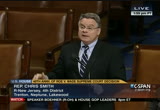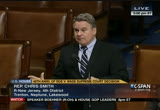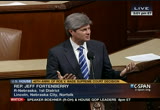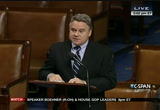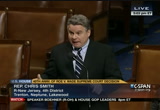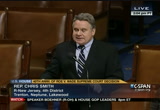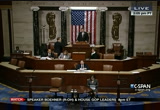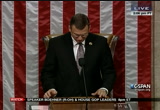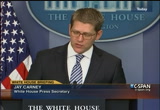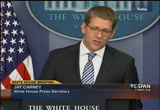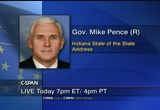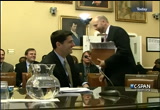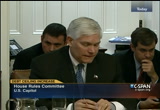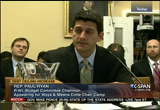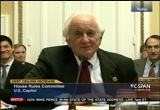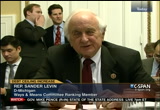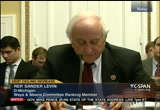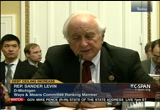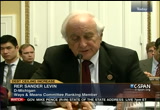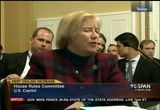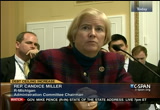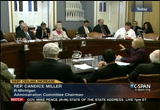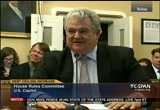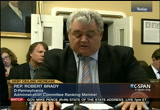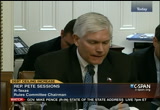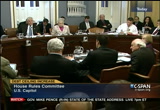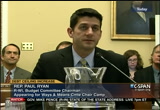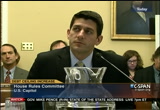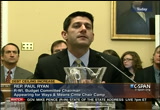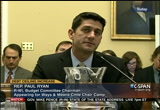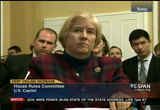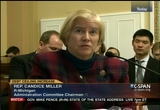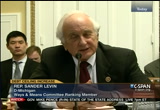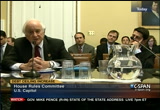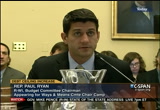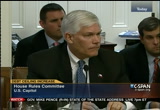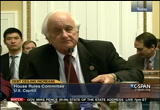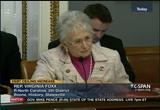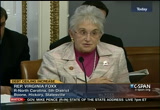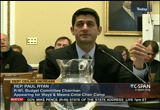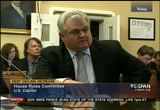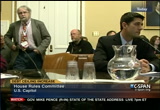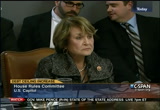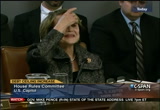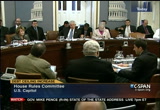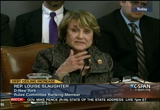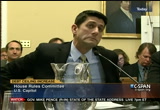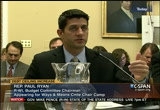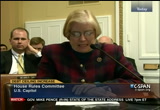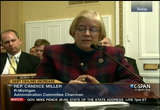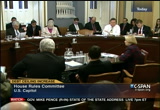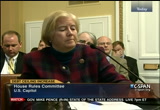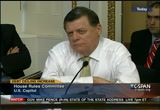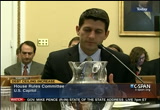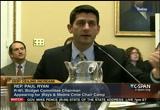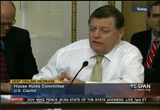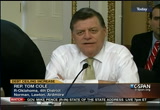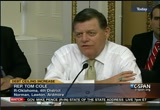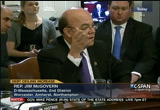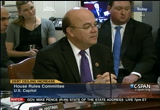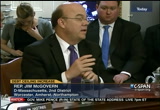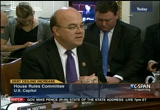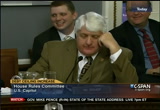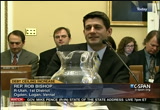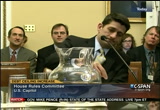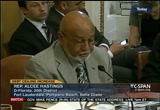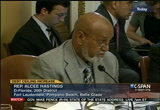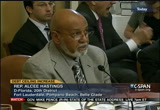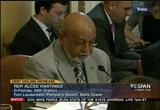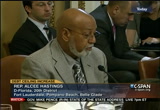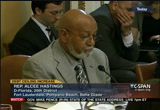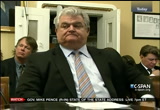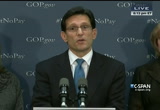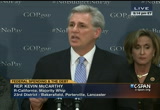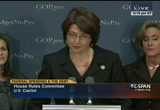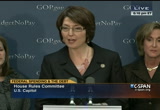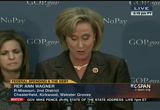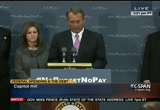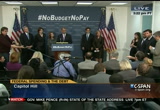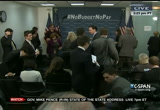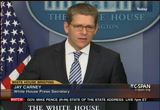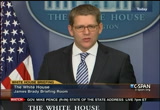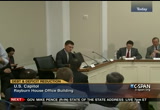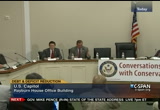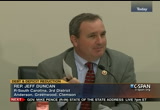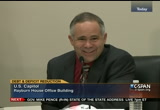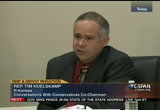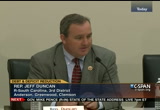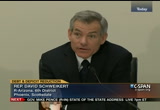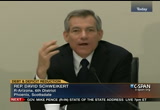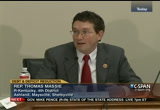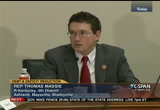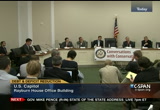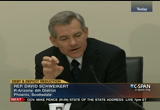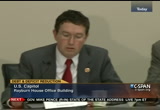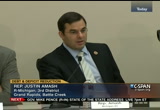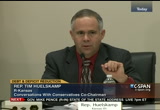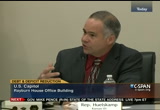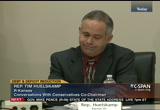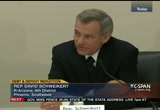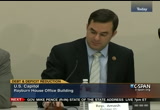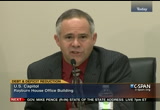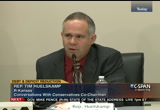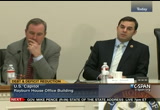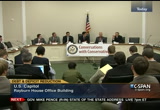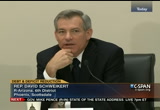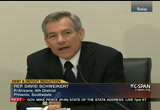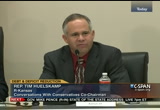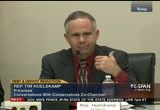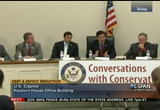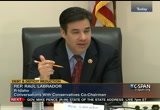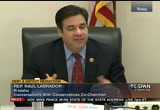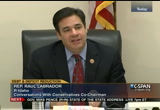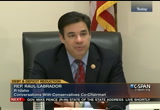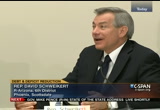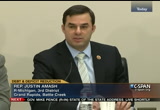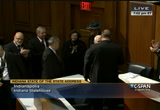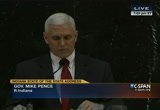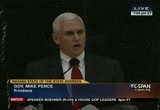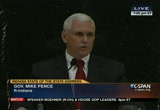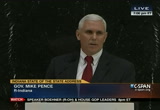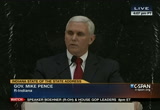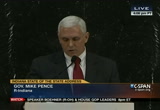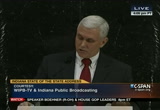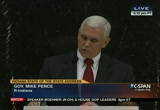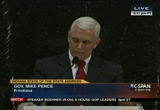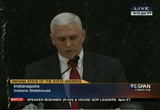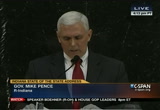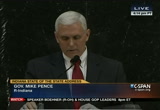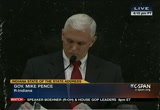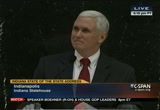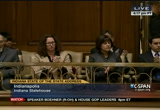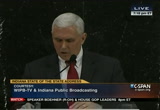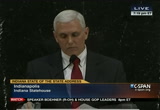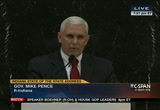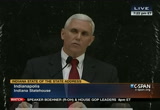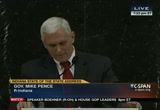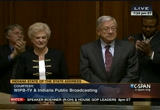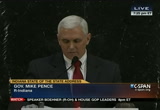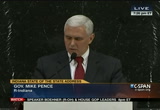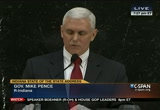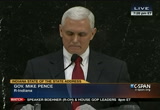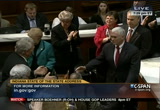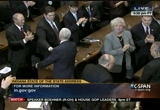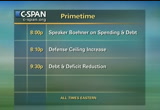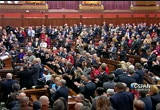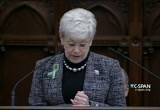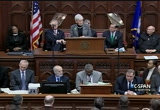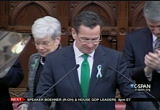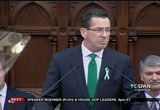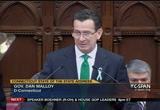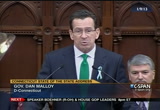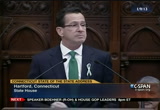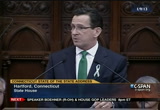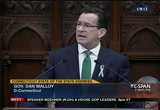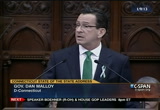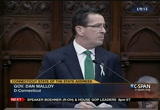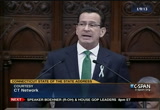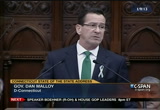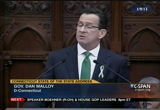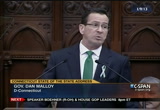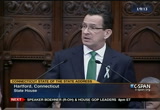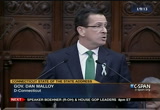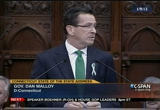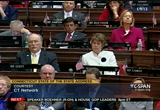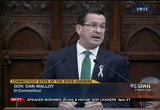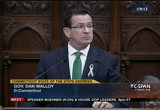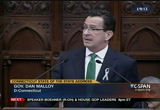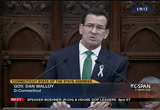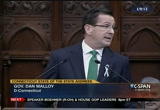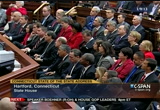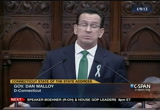tv Public Affairs CSPAN January 22, 2013 5:00pm-8:00pm EST
5:00 pm
ignore it. findings do not comport with the reality on the ground and end up sending this money -- and i met with the woman. she ran the family planning program in china. i say to my friend. for several hours, conversation in beijing. she kept coming back to the fact that the u.n. population fund was there on the ground and found nothing but voluntary abortion. of course there are loss of lives, too, but no coercion. so the white-washing that the u.n. population fund has been able to provide to this egregious violation of women's rights in china and now we today under the obama administration are funding it, mr. fortenberry and mr. speaker. it's something that has to end. we should be on the side of life and respect, not enabling --. .
5:01 pm
mr. fortenberry: people may not agree with us, but the vast majority of americans do agree that the government should not be entangled in this. in other words, taxpayer money should not be going for the provision of abortion. that's one bit of good news. the second bit of good news is, i think, again, those of us who have been here a little while, who have been in these trenches trying to beg and plead for an increase of awareness as to what the consequences of abortion are, young people are recognizing that, again, there's got to be a better way. they've lived with this through their generation. they've seen the scars, seen the wounds, seen the effects on society and they're coming forward and saying women deserve better. can't we be loving enough, can't we be big enough to do something different here? and i think that's a great sign of encouragement for two reasons. one is projecting forward, maybe we can reshape society.
5:02 pm
but also heal the wounds that have already occurred. because they are substantive indeed. and i think it's important, and young people, i believe, recognize this. they're there saying, don't make this choice. it's a false choice. particularly if you feel coerced or abandoned. there are people here ready to help, love, get you through. but if there is that deep wound, we're also here to heal and help. i think it is great. it inspires me people would come to the capitol and say, legislators, old generation of america, let's change this paradigm, let's change this idea because it's not serving our country. it's not serving our people. it's leaving us deeply, deeply hurt and we can do better. mr. smith: i thank the gentleman for yielding. you know, one of the things that is so great about the pro-life movement, it loves and cares for women during the time of their crisis and if they do procure an abortion, they are
5:03 pm
there again with project rachel and all of these outreaches that help women find reconciliation and peace. you and i and others have -- mr. fortenberry: and men. mr. smith: have lost track of the number of women we met that have found that peace. we had four women today at the 40 years of victims who told their story but also of the terrible crisis of the abortion but also the reconciliation and peace that they found later. you know, you make a very good point, mr. fortenberry, about the young generation. i have never seen more pro-lifers at the march for life than we have seen now. i went to the first one back in 1974 with my wife, marie, and have made everyone -- every one thereafter. when i speak in schools, i used to get a great deal of pushback in answer to the question of the right to life. there are people who push back but many students say it's life. ultrasound has helped enormously to open its window
5:04 pm
to the wound. we also remember the founder who became a pro-lifer and said if if wombs had windows, the ultrasound is a window to the womb and you can see that unborn child, sucking his or her thumb. you know, doing sum remember assaults inside the womb. blobs of tissue and proteo plasm don't. i think this young generation has another perspective as well. one of my favorite musicals is les miserables. there is a song sung by mar rimbings as. victor hugo's les miserables. he said there is a grief that can't be spoken, there is a pain that goes on and on, empty chairs and empty tables where my friends will live no more. we have empty chairs and empty
5:05 pm
tables, a third of this generation has been killed by abortion. you look to your left, you look to your right in a classroom or diner, there are missing children and now young adults, even up to the age of 40, since 40 years ago row v. wade was handed down. empty chairs, empty tables and i would add to that empty cribs. i thank the gentleman. mr. fortenberry: i thank you for your passion, your deep belief. i think time is to put the past behind us. let's march arm in arm with the new civil rights movement to say that we as a nation can all stand for the beautiful gift of life. i yield back. the speaker pro tempore: for
5:06 pm
what purpose does the gentleman from texas seek recognition? >> thank you, mr. speaker. i send to the desk a privileged report from the committee on rules for filing under the rule. the speaker pro tempore: the clerk will report the title. the clerk: report to accompany house resolution 39, resolution providing for consideration of the bill h.r. 325, to ensure the complete and timely payment of the obligations of the united states government until may 19, 2013, and for other purposes. the speaker pro tempore: referred to the house calendar and ordered printed. for what purpose does the gentleman from texas seek recognition? mr. sessions: mr. speaker, i move that the house do now adjourn. the speaker pro tempore: the question is on the motion to adjourn. those in favor say aye. those opposed, no. the ayes have it. the motion is adopted. accordingly, the house stands
5:08 pm
5:09 pm
have legislation that he'd like to see congress passed? are we back to cap and trade? what specifically does he want to do that he didn't do in the first place? >> i think president has longed supported climate change. i think bipartisan opposition to legislative action is still a reality, the president's position remains the same as it was in the first term. he looks forward to building on the achievements made in the first term and he looks at this in a broadway because this isn't deficit reduction, for example, is not a goal onto itself. we pursue it in order to help the economy and help create jobs. otherwise it's not worth the effort, in his mind. >> mike pence delivers his first state of the state address tonight. we'll have that live for you at 7:00 p.m. eastern here on c-span. tomorrow, secretary of state hillary clinton testifies on capitol hill on the attack on the u.s. consulate in benghazi, libya. first up, she's before the
5:10 pm
senate foreign relations committee. that's live at 9:00 a.m. eastern on c-span3. then, in the afternoon the secretary before the house foreign affairs committee. that's set to get under way at 2:00 p.m. eastern. again, both of those hearings live on c-span3. also, c-span.org tomorrow. also tomorrow, the house will postpone a decision, will debate a bill postponing on raising the nation's debt ceiling. you saw pete sessions, the rules committee chairman, filing that rule on the house floor a moment ago. they met this afternoon to discuss the flan which would require both chambers of commerce to pass a budget plan by april 15 or have their salaries withheld. the debt at $16.4 trillion. the meeting is an hour and 20 minutes. >> i want to welcome our -- three of our four witnesses that are here. it's always a fun thing to see a star of the show, everybody
5:11 pm
wants to get their autograph. mr. chairman, welcome to the rules committee. we're delighted that you're here today to discuss h.r. 325, a very important bill. and i noticed the former chairman of the committee, the ranking member, is here. we also welcome her testimony that will begin. we'll give mr. brady a chance to get here, but the chairwoman, the head of the house administration committee, the gentlewoman from michigan, and delighted that you are here. as always, the rules committee is delighted that you've taken time, both we were excited about your presence today. a chance for you to be before the committee and to talk about our business and the important work that we do here in the congress as we prepare for a vote tomorrow. and as always, without objection, we'll accept your words that you wish to put in the record. if you wish to summarize or give us your testimony now, the
5:12 pm
gentleman from wisconsin is recognized. >> thank you, mr. chairman. yeah, i'll ask unanimous consent that it be included in the record. >> without objection. >> i'm here on behalf of my chairman, chairman camp, as the committee of the ways and means committee. this is in the jurisdiction of the ways and means committee, that's the hat i'm wearing here. this legislation accomplishes two things. the shorm-term increase -- short-term increase and ties the debt limit increase to our budget process. it provides that if each house of congress has not passed a budget resolution by the statutory deadline of april 15, members' pay will be withheld until that house passes a budget. this is based on the cooper bipartisan legislation of the 112th congress. i wish we weren't here in this position. the reason for this short-term extension is to just get congress to actually follow the law that congress wrote in 1974 which is to pass a budget by
5:13 pm
april 15. we're not saying what kind of budget they have to pass. just pass a budget. reason is the senate is going on four years now for not having passed a budget. we think this gives us the time we need in this nation to have a good thorough, vigorous and honest debate of what it takes to get our fiscal house in order and about how to budget. families budget. businesses budget. our federal government should budget. we actually have a law that says we should budget. all we're saying is follow that law and that's why the short-term extension before you today. i'll let the rest of it speak for itself. >> thank you very much. mr. levin. >> first, welcome, mr. chairman. >> thank you. i think this is the first -- >> i think this is the first time i have been before you. the first time any of us has been in the chair. >> thank you. i hope i'll do good enough and make you want to come back. >> i'll come back whether i
5:14 pm
want to or not. [laughter] >> we still welcome you being here. by the way, for both -- all three of you, please note we have several new members down all the way at the end, the gentleman, dr. mike burgess, chairwoman ileana ros-lehtinen, and then the young member from oklahoma, tom cole, who is coming back on the committee. and we're delighted. we hope we once again greet you with the respect that we do, this ways and means committee, the house administration committee. we'll see if we can change your opinion a little bit. >> no. and thank you very much. welcome to the new members, including one young veteran who has chaired another committee. let me be very brief because we've been through this before in the summer of 2011.
5:15 pm
the house majority here toyed with the debt ceiling. and the ramifications were i think not only serious but severe. in terms of job creation, august of 2011 was the worst in the last three years. the market plunged in those two months 2,000 points, and it had in that period the worst single day drop in history. on august 8, it was looking at my notes on very exact, 635 points. the treasury was forced to spend well over $1 billion in interest payments, and i think we all remember so vividly that
5:16 pm
there was a downgrading of our credit rating. so a postponement of three or four months has more than the potential of some very serious consequences. and so we urge very much that as this committee considers this bill that you remember what happened before, only 18 months ago, and i think you seeing the debt ceiling -- using the debt ceiling for leverage is a mistake. i'll finish with this, because we were at the ways and means committee and i gave the opening statement, and one of the witnesses are talked about gramm-rudman. it was attached to a debt ceiling bill.
5:17 pm
i was among the democrats who voted for it, but it passed -- it was deemed passed in the house. and the debt ceiling bill was used by senators as a vehicle, not as a threat. and not for leverage but as a vehicle to attach deficit reduction. so the use of the debt ceiling for the purpose that is ascribed to this one does not have a history that supports its use for this purpose. and so to the extent that you have the ability to look at this issue, i would urge that this is not only a dangerous precedent but a very likely
5:18 pm
problem for the economy when we need to emphasize economic growth and jobs. so i say that in a somewhat sober way because of what happened before. thank you. >> thank you very much. i'd like to welcome mr. brady, former chairman of the house administration committee, who's joining us today and our new chairman -- chairwoman candice miller, will be recognized at this time. chairwoman. >> thank you, mr. chairman. and i also am delighted to see you sitting in the seat there and welcome to the new members of the rules committee. i feel like i got florida covering my back over here. yeah. got your back. and i'm delighted to sit next to my good friend and colleague, sandy levin. interestingly enough, sandy and i actually share act. sometimes you hear the term, reagan democrats.
5:19 pm
it was from our county. you have two. you have two very divergent beliefs coming out of a county. but one thing that is a very commonality of think of a county like mccomb, is we have budgets. we pass budgets on time. we balance them. we just think you should have a budget. interestingly enough, just before i came here, before we had our vote series, i was doing something i call congress in the classroom where i was going to call it skipe, but it's the new technology as uvo. i talk to all these kids in my district, my part of the county, about things that are going on in congress. i was telling them about this particular piece of legislation that was going to come before the congress tomorrow and tell them that the senate had actually not passed a budget in almost four years. they said, how could that be? isn't there anything you can do to force that? i said, we're going to try tomorrow and it's unfortunate
5:20 pm
it has to come to that. whatever kind of budget the senate would pass, obviously the house republicans would very vehemently disagree with it. however, it's a way to begin a negotiation. where you're not negotiating with yourself. i think most folks, whatever business you might be involved in or a government entity or your own household, a budget is a blueprint, it is a blueprint for a path forward to your spending try ortiz and how you proceed. -- priorities and how you proceed. i appreciate all the work done by my colleagues on ways and means on this as an important piece of legislation. i just came to add my voice to associate myself with the remarks of my colleague, mr. ryan. but i would also mention the caveat that has gotten a bit of attention is the no-pay clause without having the senate or the house, either respective chamber, not pass the budget
5:21 pm
and whether or not that meets the constitutionality, the confines of the 27th amendment. i'm not a constitutional attorney. i am not an attorney of any type. we've -- our committee has looked at this quite a bit on our side. we think that placing the members' pay in escrow until such time as that particular chamber passes a budget is constitutional. it meets the constitutionality of the 27th amendment. as long as we -- the member actually is paid by the end of the 113th congress. there's been some questions. somebody asked me just on the floor actually for instance -- let's say, you know, x amount of times passed before the payment would be made whether or not that congress should be -- whether or not the escrow account would be accruing interest for the members and if the interest is not accrued, would that be a problem with
5:22 pm
the 27th amendment? but interest on any kind of federal spending in escrow or whatever has to be done by a specific statute and there is nothing in the statute for the 27th amendment to require that. so i think -- i feel very confident that the 27th amendment and the constitutionality of that would be upheld with the bill that the house will be focusing on tomorrow, and i look forward to its passage. thank you. >> thank you very much. mr. brady. >> yes. thank you, mr. chairman, and ranking member. congratulations to you, mr. chairman. >> thank you very much. >> i will miss mr. dreier. but i'm sure -- >> you sound a lot like mr. levin. he wanted david dreier back. >> no. i think i can -- i think i can get along with you too. but he was -- he was fun to watch. he was. i got along with him well. i liked him. but, mr. chairman, i believe that congress needs to raise
5:23 pm
the debt ceiling to honor our commitments to our seniors, our veterans and that raising the debt ceiling is only about paying bills that we already racked up. i also believe the best way to achieve these goals is through a long-term balanced approach. it is not yet clear to me that this bill is a viable vehicle to achieve those goals. i, unlike my chairman, have not had a long enough time to look at this. our committee hasn't had a long enough time. we just got it this morning. so as you know we just received it. sorry. yesterday. considering the deals with how we fund the government, that potentially raises constitutional questions, i think it deserves a serious look. as we continue to -- i hope this committee will grant an open rule so we will -- so we can see if these improvements need to be made. we will have the opportunity to do so. house administration is responsible for the members' pay, component of -- many component of this proposal. among our concerns is the constitutionality, a section that's drafted.
5:24 pm
we know the 27th amendment -- whether or not this is a varying or not. again, i am not a constitutional lawyer. i am not a lawyer of either kind. i don't apologize for that. the compensation proposal may do just that. it's unclear what pay is withheld, how this impacts other benefits and a host of other considerations. as we continue to review the bill and its possible implications, we may need to improve the legislation. the only way we can accomplish that is by adopting an open rule and i encourage this committee to grant that and i thank you for your time. >> thank you very much, mr. brady. i have heard, too, overwhelming -- two overwhelming questions come up today and one is, mr. ryan, which i would ask you this question. the gentleman, mr. levin, really alludes to the uncertainty that's caused in the marketplace. and it was my real recollection without studying this very clearly i think what the markets and the analysis of
5:25 pm
that said was there's great damage if you don't address the issue as opposed to going through a deliberative process where both sides or all three sides deal with each other effectively to get it done. what would be your take on this issue? >> having met with the rating agencies and having met with the people at the rating agencies, it wasn't the fact that we were having the debate. it was the debate would not result in fiscal consolidation, as they would call it. let me point to the evidence of fitch. fitch is a rating agency that recently put out a negative downgrade warning which said it's not that congress is going to have a debate. it's that the political system isn't working to result in fiscal consolidation and getting debt and deficit under control. it's this may not materialize in a result where we actually get our debt and deficit under control, and if we don't do that, then we'll probably have a downgrade. it's not the fact that we have political theater or a rank
5:26 pm
russ debate. it's the fact that if we don't get a down payment on debt reduction, then we'll have the downgrade. what they're doing is they're looking at the projections of our fiscal imbalance. the fiscal gap as they call it. if nothing results from this, because they conclude that the political system is broken, then they'll give us a downgrade. so i would arpg it's really the mechanics and the math of our fiscal problem and the lack of a will to deal with that or results coming out of this place to deal with that is what's creating these downgrades. >> have you analyzed or paid attention to what the president would like for us to do on this, what his position is, mr. ryan? >> we obviously had talked with the treasury department at the white house. and the president's comments. he wanted to have the limit raised indefinitely, was his position, during the negotiations at the end of last year. so he doesn't want congress to have this authority. obviously we believe this is
5:27 pm
clearly authority that resides with congress. power of the purse. second point is what we're doing here is we're giving the administration the ability to meet the nation's obligations while we have the time to consider budgets. we have statutory deadlines. the president is supposed to submit his budget, the first monday in february. he's missing that deadline clearly, according to the president's budget people. congress is supposed to pass a budget by april 15. the house and the senate. in order to accommodate those deadlines so that we can actually have a very important, vigorous debate about how best to solve this fiscal gap, we need the time to do that and that's what this does. >> mr. ryan, do you believe it's in the best interest of this country for one or two people to be at the table to solve this or rather a more open process? >> that's the other point we wish to make. this is not something where you're going to fix the nation's immense fiscal problems with some back room
5:28 pm
deal. we want to commonly refer to as regular order. we think we should deliberate. we think we should go through the committee process. we think we should produce budgets that shows how we intend to fix this fiscal problem and prevent a debt crisis. the people who need government the most, the poor, the elderly, the sick, that's who gets hurt the worst. if you have a debt crisis, then you're cutting money indiscriminantly. then interest rates goes up. people have a hard time paying their mortgage, student loans. that's the debt crisis plaguing europe. this is what we seek to prevent. what we want to do is go through regular order where every member of congress has their voice heard so that their committee and then their party, the republicans in the house or the republicans and democrats -- democrats in the senate, they can produce a budget which will pass that will show the art of governing. the 1974 budget act is clear.
5:29 pm
there are parts i don't like. this one says you got to pass a budget. the congress should operate on a budget. we haven't had one for four years and that's because the senate has chosen not to pass one. we need to get back to the art of budgeting and have it through regular order and this is what it does. this buys us time so we can have the debate that fitch and the rating agencies says we need to have. how will we prevent a debt crisis? how do we make sure we don't leave our children and grandchildren with a burden of debt that will suffocate their futures? >> mr. ryan, today you represent the ways and means committee. however, you sit as the chairman of the budget committee for the house of representatives. is it your intent to move forward to do the same that we would be asking another body to do and that is produce a budget? >> the debt limit is jurisdiction of the ways and means committee. it is my intent, as i did last two years, is to produce a budget in the budget committee and bring it to the floor and pass it. i did it each of the last two
5:30 pm
years in fulfillment of the 1974 budget act and we anticipate doing the same thing again. >> well, on behalf of myself, i would say, as a fellow committee chairman, i applaud you for doing the hard work. i've been on the budget committee, served with you in the budget committee. it's a lot of hard work, a lot of long hours, but it produces things that gives people confidence that we're addressing those things. thank you very much. >> thank you. >> mrs. miller, if i could ask you, i've heard our two colleagues from the other side of the aisle really kind of allude to this five-page bill that we have before us today that i have read several times and i think i understand it but wouldn't it be true to say that the senate would have to agree to this if it were going to become something that they would have to live by? >> yes. >> so in other words, this is a document which we're producing
5:31 pm
-- >> has to go to the senate. >> so if they have problems with it then they would take up that issue and deliberate that. we're not in essence laying off on another body our own wishes. we're rather stating what we would like to do and we're placing ourself in the same position that we would be placing someone else. would that be true? >> we're putting ourself in position to follow the law. >> and also perform. >> if the senate passes it, they will be following the law as well, which, again, they have not done so in the last four years by not passing a budget. you know, it's interesting -- without naming any names, but we read some of the articles here where a number of the members of the senate, democrats in particular, have said this is a great opportunity for them to pass a budget. talk about tax reform or various kinds of things. the debt ceiling, the sequestration, etc., that really have not been addressed appropriately for the nation.
5:32 pm
so i think that is a good way to look at it. it is an opportunity to follow the law and do our jobs. >> thank you very much. i agree with you. i think both sides of this capital will have an opportunity to accept this bill , vote for or against it, to debate it and the merits within. i think we have seen where several prominent democrats have really accepted the challenge to get that done. mr. levin, did you want -- >> just briefly. my guess is -- >> the gentleman is recognized. >> we'll debate this tomorrow. just a few things. i'm in favor of regular order. that doesn't mean there's any guarantee of the result and to use the debt ceiling as a lever i think is a very serious mistake.
5:33 pm
after the credit of this country was downgraded, a senior director of standard & poor's -- this was right after it -- said the following about american political institutions that they were undermined -- i quote -- that people in the political arena were even talking about a potential default. and essentially this bill does that. and if i might say to mr. ryan, we're on the same floor. we talk to each other a lot anyway. i think it will be helpful in regular order if there were a budget brought to the floor of the house that had bipartisan support and was a product of regular order with strong bipartisan support in the budget committee and on the
5:34 pm
floor. thank you. >> thank you very much. >> we look forward to your support. [laughter] >> mr. ryan. >> participation. >> a new issue has just been brought up by the gentleman and that is perhaps the timing, do you believe that this is timely and that you've given people an opportunity rather than waiting until the last minute and thus getting to a deadline and having to react? >> mr. levin and i are friends. >> he and i are friends. >> our intention, as before, is to write a committee mark, bring it to the committee, entertain probably at the 40 or so amendments, some of which we've taken in the past, and then to bring a product out of committee. there may be irrecognize seibel differences. we will -- irreconcilable differences. that's the way things ought to be. there was one budget that did
5:35 pm
get a bipartisan vote. didn't get many votes. it was cooper and latourette and a few others. there was some bipartisan votes. got 35 votes or something like that. i hope it happens in this congress. there may be a moment where we'll have irreconcilable differences on how to solve these problems. at least in the house we brought budgets. mr. van hollen, to his credit, brought a budget and brought it to the floor, to his credit. that didn't happen in the senate. they didn't even attempt to do that. so the senate hasn't done that. all we're saying is let's get the senate in the game to do that so we can debate how to fwicks a problem, not whether we are going to try to fix a problem. >> mr. chairman, i have been handed a note saying i need to go to another for forum.
5:36 pm
>> i recognize that. and the gentlewoman, ms. slaughter, hears that. >> i should be there too. >> yeah, i'm next. i'll talk long so that you -- >> let me ask very quickly if someone has a question for mr. levin before he goes. and anyone -- >> you have to leave. then i would not stand in the way of democracy. >> i think you'll give me leave. and the chairman will? >> well, as always, we want to reserve the right, as we agree with you, to at least give our members an equal shot and i see no member necessarily that has a question. >> i'll try to come back if you're still in session. >> the gentleman will be considered excused at this point then. >> thank you. >> ms. foxx.
5:37 pm
>> the resolution -- the bill that's been brought to us today , and i don't really want to repeat or ask chairman ryan or chairwoman miller to repeat the things that they said, but i do think it's important that we highlight the fact that the house, under republican leadership, has been adopting a budget. we have the last two years. and the senate has not. and there is a law that says we are to adopt a budget. chairman ryan pointed out that the president's folks have said they will not adhere to the law again this year. my recollection is they were late last year. i think they submitted a budget but my recollection is they
5:38 pm
were late last year. i may be not correct on that. >> they submitted a budget. they missed the deadline three out of four times. >> ok. so i think what's important here is we are the lawmakers, and it's important that we be good role models for the rest of the country. and we certainly are cast gaited on an individual level when we break the law. some people have. some inadvertently. some purposefully. but i think it's very important that we follow the law. so i think it's important that we continue to point this out to the american people and i'm very pleased that we're going to be doing this. raising the debt ceiling is a very, very serious issue. and we don't do this lightly. nobody i think should do it
5:39 pm
lightly. i believe that the way we are going to be doing this will help us move forward with working on the budget. i think you don't get the baseline numbers to -- until when, mr. ryan? >> the c.b.o. is late because of the end of the year fiscal issues. they anticipate getting their january baseline updated on february 4. typically you have a budget resolution off of c.b.o.'s rescore of the president's submitted budget. the president's budget is coming late. the administration has not said when they are going to submit a budget, so we don't know when c.b.o. will have the opportunity to score it. usually takes about three weeks to score it. then you get your final baseline with what you normally write your budget. so that's the issue here. timing. but since c.b.o. will give us their newer baseline, we call the january baseline, in february, that gives us something to start with.
5:40 pm
>> and i read an article the other day that says one of the things that resulted as -- has come about is the result of what we did january 1, i guess it was, was that we should not be having arguments about baseline. that we hope that's been cleared up and that will be a useful thing going forward. i know it is a difficult thing for you to explain and me to explain sometimes to people, but i just want to applaud you all for what you're doing and want to thank chairwoman miller for coming. and mr. brady, it's always nice to see you. thank you very much. i yield back. >> sms lawsuiter. >> thank you, mr. chairman. first, i'd like to ask unanimous consent to put the administration's statement of policy in the record. >> without objection. >> and you know, we all started out, everybody's friends. you are friends with sandy.
5:41 pm
and i want to be your friend. i got to tell you, friends, i am not sure what it is we're doing here today. this was filed yesterday morning, 7:00 on inauguration day. i read the article, which i assume was -- everything i heard was the father of this idea. and -- but the fact is the democrat party has been totally left out of this. we keep going down the road here, sort of lurching and jerking about. sort of like plan b. leaving us out, calling us up to the rules committee where we all sit up here, sitting up higher than everybody else, looking so we really know what's going on. we really have about had it. there is nothing called regular order. we talk about it all the time. we talk about budgets being law. we read iter week. this is a step too far for me. i really think what you're
5:42 pm
doing here, while i appreciate it as well as i think everybody else, on my side of the committee, that the idea of dollar for dollar business seems to be gone. we're glad for that i'm not really clear. we pass the law. we think that the senate will pass the same bill. is that the same idea? we believe that will happen? >> that's how a legislative process works. the house passes bail. the senate acts. and if they don't act you go to a conference committee. >> there's been no committee hearings, no public hearing, no discussion. >> there is a hearing right now on ways and means. >> i'm assuming you are not having the conversations with the snafment. >> we have. this bill came from a member on your side of the aisle, mr. cooper. it came -- the decision was before that article. i read that same editorial after we had decided this is a better course of action. we felt the bipartisan bill
5:43 pm
that mr. cooper, the democrat, authored was a sound way forward and that's why we included the cooper legislation with a short-term debt limit extension. >> but given the importance of this, i'd like to know what kind of negotiations you've had with the senate. we don't know if the senate will pass this or not. i said that the white house supports a short-term extension. >> have they've been discussed -- >> they've been sent the legislation. i don't know what the senate will do. but that's -- i think that happens fairly often. i don't know if every bill we pass through here we first have to wait for the senate to say that they will support it and then we pass it, i don't think that's how the legislative process works. i think -- we don't know if the senate will pass it or not. >> i think we're down to the alice in wondererland piece, that we pretend that the
5:44 pm
legislative process are working. you and i both know that it is not. something like this we would have had committee hearings. >> the goal is to get the legislative process working. >> you know, we are perfectly willing, even eager here as part of the congress of the united states to be part of what you're doing. >> that's -- >> we never know. it's sort of dropped in on us, parachuted in from someplace, telegraphed in the newspaper, maybe. but our participation in this, i understand it, we were sort of talking by ourselves. we didn't quite understand the paid piece. if we pass a budget, house members gets paid, is that right? >> that's right. each chamber has the responsibility to pass a budget through their chamber. >> and the senate -- >> and the pay is in escrow until they do that. after the statutory deadline. >> so the house will be treated -- >> the house is in control of its own fate. the senate of theirs. so the frustration that is expressed in this legislation is the fact that our federal
5:45 pm
government has gone without a budget for almost four years. it is that the senate -- yes, your party is in control of the budget -- the senate has chosen not -- >> we are talking about raising the debt limit here. we are not talking about the budget. >> that's what this legislation does. >> all right. you've done that. >> and this legislation is authored by a democrat here in the house. >> the fact of the matter is that there has been no regular order on this, and we've gotten used to -- we went through plan b. there was no regular order on that and you know how that turned out. you remember -- >> are you talking about the fiscal cliff? >> on the fiscal cliff. >> there are other plan b's but i understand -- >> there are a lot of plan b's. i just want to know which one you are talking about. >> let me reiterate that we would be more than happy to join in your process here. maybe even give you a great idea every now and then. maybe something we can all work together on. once again, the house of representatives would be the people's house, and all the
5:46 pm
people sent to serve here will be able to participate in it. we long for that day. >> i appreciate that. i had a conversation with mr. cooper this morning which was we saw a democrat with a piece of legislation that we thought was a good idea. that's why this includes that legislation. >> well, it would have been nice if some of the rest of us heard about it. we would have -- >> i don't know what to say about that. >> there's not much we can say about it today. i'm sure you have the votes to pass it and it will go out of here ok. the strongest terms i can, the idea of continually coming up here and sitting here with something that was just handed to us and trying to pretend that we're part of the process here is -- i just can't do that any more. thank you very much. >> thank you very much. in defense of me asking you three or four as it were to come up here, i'm delighted that we did this now rather
5:47 pm
than waiting until the very end because, mr. ryan, i don't even know -- and you don't have to respond to this -- but i don't know what day we have to have it ready. and so i viewed that as committee chairman, speaking with each other, including our republican leadership, that we were trying to do the correct thing and to make sure the administration read us as clear. this is not a poison pill. this would be something that the senate would have to agree to and public comments out of the senate by senate democrats have indicated the willingness to accept it. >> right. that's one of the reasons we are doing it now because we don't want to bring it to brinksmanship. the statement of administration policies, snap, we use acronyms around here, we don't know what the x date is, meaning the date when the borrowing money is run out. it's estimated that that occurs sometime between february 15
5:48 pm
and march 15, but we don't know when that is. we don't want to test it. that's why we're doing this now. >> i applaud chairman camp and you and each of you for being here today. mr. cole. >> thank you, mr. chairman. i appreciate that. just one question to any of you that might care to take it up. i heard a number of people that expressed concerns about the constitutionality of the pay provisions. i know, mr. chairman, you looked into that but i invite either two gentlemen to comment as well. can you elaborate on that a little bit, what kind of research you've done to ensure this is within the constitution? >> ok. i -- i will preface my statement by reminding you i am not a constitutional attorney. i have my notes from my constitutional attorneys. >> that gives me more confidence. >> again, you know, james madison, obviously, proposing the 27th amendment ks 1789, and i have the attorneys go through and they agree, our side,
5:49 pm
anyway, the toshese agrees it applies to varying -- varying being the operative phrase -- of the compensation. it's interesting. they looked at a couple cites -- couple of lawsuits that have been before the supremes, about this issue. one was about the cola provisions that the congress automatically gets some increases, etc., and there was another one that was brought by a congressman, bob schaefer. some of you might recall him. it was before my time. on the grounds that -- let's see -- 27th amendment. anyway, i won't go through all the weeds on that. again, it spoke to the varying. they decided that varying the compensation is really the operative phrase, as i say, with that. so our attorneys in the housed a minute, on our side, agree -- house admin, on our side, there
5:50 pm
is no -- as long as you pay members at the end -- i should say -- by the end of the 113th congress or obviously we would like to have this negated completely by having the senate pass a budget, the house pass a budget, senate pass a budget, as required by law and on time. so as i've talked to them, i feel pretty good about the constitutionality of the 27th amendment and how it applies to this. i would, if i could, make a couple other comments. i do think it's interesting in the spirit of bipartisanship, as you've pointed out, this was a piece of legislation for the most part pretty much mirrors what was introduced in the 112th with -- by a democrat with several other democratic co-sponsors as well as republicans here. i sort of feel like this is an effort at a bipartisan -- bipartisanship. i know sandy had to leave. we were talking about the ratings agencies and what
5:51 pm
happened when we were downgraded during the last debt ceiling debate. i thought it was interesting reading the executive management report from the ratings agency that also pointed to the congress that one of the reasons -- huge reason for the downgrade, they didn't feel that the congress had the political will to address the spending crisis that we are in either. so that was also a big part of the downgrade of our credit rating. now i think, you know, we are trying to exercise the political will to address our spending by having a budget which you can't really talk about appropriation bills and all of these kinds of things in my mind having continuing resolutions to fund the government forever is unsustainable. you need to pass a budget to begin with a foundation. >> mr. cole, i also talked to attorneys, our attorneys, some other attorneys, not just on our staff and i tell them, talk
5:52 pm
to me like i can understand you. because they talk too much legal lease. i ask them, if i get a paycheck in my account every month and i don't get that paycheck in my account, so whenever it may come, at the end of the year, that's varying. their opinion, that could be. they didn't say it was. they said it could be that could violate the 27th amendment because they're varying something. not coming this month. coming at the end of the year. the other thing i would like to -- don't understand -- and i want to tell you like i think and how it is. we are kind of like trying to not punish but penalize the other side. the senate. because they haven't acted. so what we're doing is drafting legislation that's going to make our side, whether we pass or maybe sometimes not pass a budget, and we're going to punish, not punish. maybe penalize our side by not
5:53 pm
getting a payroll or paycheck until the end of the year. now i'm probably not -- i think i'm talking maybe by my own knowledge, i don't think it hurts any of the united states senators. but a mayor, one of our 435 members here, because some of them i know may have to make a mortgage payment, maybe have to make a car payment, maybe have to make an insurance payment or some type of payment. and they may not be able to talk to their bank or whoever they might be, can you wait until the end of the year? i can show you my escrow account. i'm probably thinking we'll pass a budget in the house, so maybe it might not happen to us. it may not bother the other side too much. that's my opinion. >> mr. ryan, do you have any thoughts on this? >> well, just to state for the record, it's not meant to punish people for past behavior. this is meant to get congress back to doing its job, to simply following the law to
5:54 pm
budgeting. we have a fiscal crisis. we are racking up trillion-dollar deficits. this is not a republican against democrat thing. it's a math thing. this debt crisis is coming because of the debt that is piling up. all of the independent fiscal authorities tell us this. the rating agencies downgrade us because they think our political system is broken at an impasse. therefore, no solution is occurring. and our argument is the way to break that impasse is to start budgeting. the law says we should budget. we should follow the law. we have disagreements on how to budget. but at least we ought to come to the table with each of our individuals and our plans. if you're ever going to get to a solution, what usually happens under what we call regular order is we pass our budget vision, the other side passes their budget vision, and then we bring ideas to the table and we start negotiating. that hasn't happened for four
5:55 pm
years because the senate has chosen not to even begin this process. and so we think we are advancing the goal of restoring fiscal discipline to our federal government by just getting congress, the house and the senate, to begin to follow the budgeting law again to budget. now at the end of the day we hope this will result in getting a down payment on our debt problem so that we can continue to meet the obligations of our seniors, of our military, of the people who are living on the safety net, of the vulnerable, of the bond markets so we can keep interest rates low so we can make sure we don't hurt our economy. >> i want to command -- commend you on the effort of people to just put out a budget. with all due respect on my friends on the other side, last year they were in majority, they chose not to do that. they chose thinking it would provide political cover. it didn't. i think that's what's gone
5:56 pm
"encore booknotes" the senate side. i think it's a political calculation that somehow this will spare some of our members from difficult votes. i commend you for developing a difficult budget and getting your colleagues to vote on it and it was a legitimate issue in the campaign. i have no problem with that. i think it's an appropriate place to have the discussion. you come, you vote, we go have a campaign. that helps the country clarify the issues. we move on. the house has fulfilled its responsibility in that regard in the last two years and went through the fire in the election. i think that's fair. the senate just simply has not. and it is discouraging. you know, it just takes 51 votes. that's all it takes over there. i actually heard commentators tell us, oh, no, it takes 60. it takes no such thing. it just takes 51 votes where the majority now has 55 and at one point had 59 and was unable to -- unwilling, i should say, get 51 where you got over 228
5:57 pm
of our members do last year which was actually vote on a budget going into an election year. mr. chairman, i'm delighted to see legs like this. i do think there are legitimate constitutional questions. i think those we'll have a vigorous discussion about that in the next couple of days. i'm comforted by some of the precedence you cite, mr. chairman. at the end of the day, this is about getting us to do our jobs. there isn't a member up here that wouldn't tell you it really is our obligation to write a budget. again, our friends in the majority did not. i'm really happy to see the minority, they have chosen to do so. i think it's actually a very good thing. i can tell you when we were in the minority, getting a budget and laying out there was good for us politically. it's the right thing to do. i think our friends in the senate need to follow course. and just simply present a budget that will clarify the issues. i think it will help us avoid future debt ceiling crises if we know we got some manageable
5:58 pm
plan and each side has staked out a position, we'll find some commonality, no doubt,nd i think we'll move forward. you know, until the senate actually gets in the game i don't think that's going to happen and i do think that's playing fast and loose for the people. i commend you very much. mr. chairman, i yield back the balance of my time. >> thank you very much, mr. cole. >> thank you, mr. chairman. mr. chairman, you talked at the very beginning of your remarks about a deliberate tif process, how important that was. and mr. ryan talked about regular order. we're all for that, but we're beginning not with a deliberative process and this is not regular order. this is not the product of a deliberation in the ways and means committee and hearings and markups. this really is kind of a back room deal that -- i first read about it when you were on your retreat. so we begin on that note, and i think one way to avoid that characterization would be to
5:59 pm
agree to what mr. brady asked for is an open rule. i'd ask both of you, mrs. miller, mr. ryan, whether or not you would favor an open rule here so we can have a deliberative process so that, you know, members who quite frankly haven't even read this yet because of, again, yesterday when you dropped it in, it was inauguration day, martin luther king's birthday. there are questions about constitutionality that people who are not constitutional experts are trying to grabble with. so would you be in favor of bringing this to the floor under an open rule tomorrow? >> as a fellow chairman, i'll defer to this chairman. i don't want to tell mr. chairman how to run his committee because a lot of times there are other issues that you just don't know about to take into consideration. >> does -- do you have an opinion on whether this should be an open or closed rule? >> i also will defer to your rules committee to debate afterward. that's why you have this committee. >> i'm not particularly surprised by your answer.
6:00 pm
but i think it's an important point to make. and the other thing is, you know, -- you know, i'm as frustrated with the united states senate as anybody on this committee. but i think it is a little bit disingenuous to say lay the entire blame for where we are at the feet of the united states senate. .
6:01 pm
>> to engage in leadership of your party and i engage our leadership to go through a committee process, where you did have a bipartisan -- you mentioned this was mr. cooper's idea. i looked up the bill, the bill you are basing this on and mr. cooper didn't mention the debt ceiling and another bill, said if we default on our debts, congressional pay is the last thing that gets resolved. so this is different than that. i go on record, i don't believe we should be politicizing and happy we aren't going to default immediately because we are going to kick the can down the road. but i'm tired by governing by gimmicks. i don't know if withholding the
6:02 pm
6:03 pm
disagree. >> we are still intraaddition out here? >> let me do this quickly, just in the short time we have been here, presuppositions of what we will or will not do. we haven't done a budget yet for this year. >> that's correct. >> this doesn't presuppose the budget or whether or not the senate will or will not. it says there has to be a budget and in order to do that --
6:04 pm
>> when i was an accounting, mowed lawns, i got paid. if i didn't do the work, i didn't get paid. if you work, you get paid. now, we have constitutional issues. >> more important issue. after i wrote three more letters that came in over the weekend, i get my pay for life. however, for the record, the key issue is this says we get a budget and doesn't presuppose what that budget is and i yield back. >> thank you, mr. bishop. two other points, one, we don't know when the actual date is.
6:05 pm
we presuppose the work that needs to be done so we can work at this also, because we place on the senate the same thing we place ourselves, a responsibility to get this done and as mr. ryan has said he will produce that budget accordingly. >> thank you very much. i thank all of our witnesses >> our friends and colleagues must be amused by this exercise. the 113th congress is starting with the way the 112th congress
6:06 pm
ended. during the summer, i made the comment that if kicking the can down the road, which is what we're doing, was an olympic sport, then the united states congress, and by that i meant the senate and the house would win gold, silver, bronze and aluminum, because we have this habit of kicking the can down the road. the republican philosophy seems to be, why do now what we can do later and why do later what we can even do later. this isn't no way to address our fiscal challenges and no way to rule the economy. you lost a lot either in the koch brothers and the tea party
6:07 pm
group they fund has come out against using the debt ceiling as leverage rather than holding it hostage. and yet the republican congress is still in turmoil over whether this is the right thing to do. i was fascinated by mrs. miller's comments regarding the escrow and whether or not interest would be undertaken. i was looking at the 401k maneuver for $150 billion taken
6:08 pm
out of the 401k plan of congress and the federal employees. and the first thing that came to my mind is, if you are going to take $150 billion out and i don't have many money over there, but you don't get interest. it ain't but a nickel, but a penny and somehow or another that seems to be a problem here as well. but being out of sight doesn't mean being out of mind. and the republicans can't will away our national responsibilities just because it conflicts with the ideology of your more extreme members. i imagine come may, my friends on the other side will find another loophole that allows them to pay off the debt ceiling for another three months. we emerge from almost crisis to
6:09 pm
almost crisis through the next year while at the same time you notorious on the other side for complaining that the problem with our economy is uncertainty. i have heard that many times than a little bit both here in this institution and in the rules committee and those that were on the political trail. now i agree that continuously threatening to fulfill our national obligations is a serious breach of economic uncertainty. but republicans seem to be attracted to this kind of dangerous gimmicks to act seriously to act on the full faith and credit of the united states. until they do, i suspect that we'll have a lot more meetings on this very issue. now as a lawyer, not a
6:10 pm
constitutional scholar, having made a lot of decisions about constitutionality as a federal judge and when i went on the bench, i was accused of being a judicial activist. and i was thrown off the bench. i was accused of being a judicial activist. and i guess that's compared to strict constructionist. and if there was ever a case, the 27th amendment was not ultimately ratified until 1999. james madison proposed it in 1789 and 39 states eventually ratified. and 1992 is not just so long ago, so it's real easy to read,
6:11 pm
it says no law, no law, with a comma varying and this is where mr. brady must have tagged the word varying the compensation for the senators and representatives shall take effect until a election of representatives shall have intervened. we just got over one and we can't do nothing until we have another one, if you read it as strict construction. but no law. now we have had some cases. we had boehner versus anderson, district court of appeals case where we were talking about the cost of living -- >> we are going to go live to capitol hill. house speaker john boehner is
6:12 pm
putting footprints on the bill that is going to come before the house tomorrow. [captions copyright national cable satellite corp. 2013] [captioning performed by national captioning institute] >> hard-working taxpayers understand that they have to balance their budgets from every week to every month. they also believe it's time for washington to balance its budget. over the last four years, house republicans have offered plans. our budget plans. we have done our budgets, but it's been nearly four years since the senate has done a budget. most americans believe if you don't do your job, you shouldn't get paid, that is the basis for no budget, no pay. it's time for the senate to act. chairman paul ryan has worked hard with the budget committee to outline the kind of reforms we would put in place to bring real fiscal responsibility here in washington. and the american people understand that you can't continue to spend money that you don't have.
6:13 pm
it's time for us to come to a plan that will, in fact, balance the budget over the next 10 years. it's our commitment to the american people and we hope the senate will do their budget as they should have done over the last four years. >> good evening. as the speaker said, our conference will look to vote on a measure tomorrow that will temporaryly extend the debt ceiling so that we can see the senate actually begin to do its job. for several years now, i think it's about four, the senate has not passed a budget. and all we're saying is, if the president and the senate -- if this country needs to incur more debt, senate, please show us your plan to repay that debt. please show us your plan to control spending. it's about time that we come together, do our work, the american people expect no less. that's why we'll insist on the
6:14 pm
house, no budget, no pay going forward. >> one thing every household looks at is how to spend their money. when you look at the crisis that you're in, the first thing you look to is where should i spend or even invest to make myself in a better place. the first fundamental responsibility of any elected official is to pass a budget. now when we took over in the house in four months, we passed the budget, many of you have said, was one of the toughest ones to come out of the house. higher vote than at any other time in the last decade. democrats said we are going to do political damage to you in the election. you know what? we were honest with the american public. where we currently stood and our budget wasn't about just today but tomorrow, but about securing
6:15 pm
medicare and building for a better future for your children. what's the history in the senate ? last time they passed the budget, the ipad hadn't been introduced. we have had trialion dollar deficits every year. nobody would expect to be paid if they didn't do their job. no budget, no pay. if harry reid cannot pass a budget, they are fundamentally moving the responsibility why they should even be in the majority. to me, this is a turning point for this country, getting to the fundamentals of a planning for the future that this could be the mark of a great american comeback. >> good evening. yesterday, the president was inaugurated and he took a similar -- he took an oath of office that is very similar to the one that we take as members of congress, to uphold the
6:16 pm
constitution and to protect this country. and it starts with getting a budget in place. that is pretty fundamental to governing and the federal government is operating right now with a continuing resolution. and we need a budget in place. we need a senate to pass the budget. it's going on four years since the senate has passed the budget. the senate has said his budget is going to be delayed. america, families understand they need to pass a budget. you may not want to do it, but you have to figure out how to balance the budget. businesses have to do it. as we move forward, it is fundamental to make sure that seniors have the confidence that the federal government is going to meet the obligations that they have committed to, that hard-working taxpayers that want more take-home pay will have that confidence, that children will have more opportunities moving forward. this is our commitment and
6:17 pm
moving forward to get this budget in place and tomorrow we're going to pass our no budget, no pay. >> the fact that we're here today to debate raising america's debt limit is a sign of leadership failure. it is a sign that we now depend on ongoing financial assistance from foreign countries to finance our country's reckless policies. this is robbing our cities and states of critical investments and infrastructure like bridges, ports and levees. every dollar we pay in interest is a dollar that is not going to investment in america's priorities. instead, interest payments are a significant tax on all americans, a debt tax, that washington doesn't want to talk about. increasing america's debt
6:18 pm
weakens domestically and internationally. leadership means that the buck stops here. instead, washington is shifting the burden on bad choices today onto the backs of our children and grandchildren. america has a debt problem. and a failure of leadership. americans deserve better. all of those words were taken from then senator obama's statement before he voted against raising the debt ceiling in 2006. truer words cannot have been spoken today. the debt burden the president was concerned about a few years ago is still a very real threat today. congress should pass a responsible budget so we have a road map to get to our serious debt burden. no budget, no pay. >> i'm not sure i need this
6:19 pm
stool, but i'm a freshman. i'm new. i was sworn in just three weeks ago today and as a new member of the 113th congress, i know how they do things in washington, d.c.,. i know how they do things in missouri's 2nd congressional district. i'm a mother of three kids and have small business roots and all i know is that every family, every household, every business, every individual must have and pass a budget. we must live within our means. it is past time, way past time for the united states senate to pass a responsible budget that is going to put us on a path towards prosperity and is going to grow our economy and is going to create jobs and increase the standard of living for hard-working, middle-class americans. you know, we talk so much about mortgaging the future,
6:20 pm
mortgaging our children's future and i care deeply about that. but frankly, we are mortgaging now the future is now. and we all -- all of us here, we want to fight. we want to fight for that nurse, that carpenter, that teacher, that grand parent, that parent, that student, we want to fight for everyone across this country. and the 113th congress has been sent here i think to be do big things, the hard things, and this is the first step in that process. no budget, no pay. >> questions? >> speaker boehner, yesterday in the president's inaugural address he suggested that immigration and climate change will be top priorities for him. what do you think of his cal for action on climate change, and is immigration a high priority? >> there are a lot of priorities for the congress.
6:21 pm
a lot of priorities for the president. and right now, the biggest issue is the debt that's crushing the future of our kids and grandkids. hard-working taxpayers understand you can't keep spending money you don't have. we will continue to focus, especially here in the next 90, 120-day period or fiscal responsibility to washington. >> a major position deals with the 27th amendment. 20 years ago you were instrumental in passing this amendment. based on the way that this bill is structured now and the provision in the constitutional amendment that calls for convening of constitutional conventions, will this have more teeth in it and hold members of congress hostage? >> you can't go months and months without a pay check. and what this does is basically says your pay gets escrowed and put on hold until such time as
6:22 pm
you pass a budget. >> senator mcconnell earlier today speculated, maybe not speculation, not a single republican vote in congress for any revenue whether that be tax loopholes or tax expenditures. is that your assessment for the house republicans? >> everybody on our side is not interested on raising taxes on the american people. it's time to deal with the serious problem, which is spending. [inaudible question] >> we are not going to raise taxes on the american people. >> complications with the white house -- [inaudible] >> you went on a big p.r. campaign last summer to say the president was responsible for the sequester. why is this a hostage that you
6:23 pm
are willing to -- >> the house has already passed a bill to replace the sequester. that is another possibility we could do. the sequester is arbitrary. but the fact is that when the sequester goes into effect, the 302 spending number comes down dramatically and it will have a dramatic effect on people's attitudes here in washington and they may get serious about the mandatory side of the spending equation. thanks. [inaudible question] >> mr. cantor? [captions copyright national cable satellite corp. 2013] [captioning performed by national captioning institute] >> jay carney weighed in on the bill that house republicans were just talking about dealing with the debt limit.
6:24 pm
here's what he had to say. >> as i said, the bill still has to overcome to concerns pressed expressed by members of the house and senate and reach the president's desk. if it does, he would not stand in the way of the bill becoming law. broadly speaking, i would point to you what i said at the top, the president's position is we have to remove these damaging fights over fulfilling our obligations to pay our bills from the process -- we have to remove them entirely, because they are so unhelpful to economic growth and create terrible uncertainty for our businesses. we could continue to engage and we will with members of congress over the need to further reduce our deficit and the president has put forward plans as you know that demonstrate the fact that he is willing to compromise and willing to meet republicans
6:25 pm
halfway on these issues and will continue to do that. but the debt ceiling needs to not be a part of that because it's just terrible for the economy and it seems also to be bad politics. >> bipartisan opposition is a reality. the president's position remains the same. he looks forward to building on the achievements made in the first term. and he looks at this in a broadway, because this isn't -- debt reduction is not a goal onto it self. we pursue it to help create jobs. otherwise, it's not worth the effort in his mind. [captions copyright national cable satellite corp. 2013] [captioning performed by
6:26 pm
national captioning institute] >> the house comes back in at 9:00 eastern time to consider the bills that we heard jay carney was talking about, allowing the government to continue borrowing. the proposal would require both chambers of congress to pass a budget plan by april 15 or have their salaries withheld. you can see live house coverage here on c-span. and in a little over a half hour from now, state of the state address from indiana governor mike pence and see his speech live at 7:00 eastern here on c-span. and tomorrow, secretary of state hillary clinton testifies on both sides of the capitol on the attack at the u.s. consulate in benghazi and will start the day in front of the senate at 9:00 eastern and later in the afternoon at 2:00, she'll attend a house foreign affairs committee hearing. both of those hearings on c-span-3 or listen on c-span
6:27 pm
radio. >> a group of conservative republicans held the first of what will be a monthly meeting with the press called conversations with conservatives. the meeting focused on the house floor vote on raising the debt ceiling scheduled for tomorrow. >> thank you for joining us. i know some people are coming in. we are going to get things started. in the interest of time, we will have to do this for an hour. it's great to be here. i'm the director of digital media at the heritage foundation. we do this monthly, conversations with conservatives. heritage has been a partner of this and today we are doing it in conjunction with our weekly bloggers' meeting and doing it in conversation. we are live streaming the event.
6:28 pm
those of you who are watching online tweet us. conversations with conservatives for the 113th congress. we have four members so far and we will be having a few others join us momentarily. congressman schweikert, congressman huelskamp, congressman duncan and congressman massie. if you would care to weigh in on some of the things that are coming up this week, no budget, no pay that was outlined. if you want to kick it off and share your thoughts on how that's going to play out. >> i will start it off and saying 1,364 days today since the united states senate has done a part of their job and that is to pass a budget for our nation. i came from the small business
6:29 pm
community. i ran a business for 16 years and i had to do a budget every year. when i was working alone, it was just jeff and i didn't have any employees, budgeting was a lot easier, but i had to figure out where i was on my expenditures and where i anticipated to be in the coming year in my income and try to make it balance. and to come to washington and see a dysfunctional senate, to see harry reid-led senate won't do the most basic thing of governing and that is plan for the future and for it to be 1,364 days. i keep a running tally. every day on my appointment card, we have at the top how many days it has been since the senate passed a budget. last year state of the union, was the 1,000th day since the senate passed a budget.
6:30 pm
i wore a button that had 1,000 days on it. big red button. we are starting to shine that light on the fact that the senate has done its job for the last two years. we have seen time after time after time that the republicans have done the responsible thing for america, we have passed good energy legislation, good budgeting legislation. we set priorities for the nation, but yet they failed to go anywhere in the senate. and with that, i yield to mr. huelskamp. >> thank you, congressman duncan. i agree with all your comments and we might come to a little different vote tomorrow on where we head and then frankly, we have to have a budget. but raising the debt ceiling for a budget to be named later is to me something i won't be able to vote for, but we are trying to understand that we have a sequester.
6:31 pm
but the resequencing issue is interesting and only in washington could that be a word, where we are trying to resequence what is going on here. one thing i remain concerned about, after two years up here, washington is broke and dysfunctional. it is dysfunctional when the president is going to be late in his budget. $50 billion in spending. most of which won't be spent until 2015 and i'll just say when i visit with constituents at home, this is the worst they have come to expect from washington, when the dust settles at the end of the day, washington, no matter who is in charge, they will spend and borrow more money and we'll have hopefully that debate in the next two, three months. but the sequester, by the way is
6:32 pm
law. there is no need to debate about sequester. that's the law. and i don't know how we win suggesting there is a debate over sequester. but we have an opportunity here to hopefully force the senate to pass a budget. but the bill does not require the house and senate to agree to a budget which is the purpose of the 1974 act, so we can't hold ourselves accountable for that and that should be integral as well. >> discretionary spending from 10777 to 974, and conservatives on this podium has been pushing for to shrink and scope of government. the bill that the representative from kansas mentioned a minute ago was the sandy bill, i put up and amendment that would cut $1 million. that is $1 million with an m, which was a plus-up.
6:33 pm
it was an earmark for legal services corporations. we weren't zeroing out, but taking away that earmark and failed on the house floor. if that is any indication of the resolve we will have to truly cut spending, i guess i'm doubtful. >> is there a commitment to balance the budget in 10 years or will there be a commitment from the republican leadership to do that? >> look, one of the reasons and this is going to be really hard -- sorry about that. i have actually had members who shall we say, those in power, those with the influence and say this house will produce a budget that balances in 10 years and there will be tough stuff in there but telling the truth, it's reality. look, i know a bunch of you in
6:34 pm
here, many of you are very, very smart and good writers. time to take one step side ways and deal with the reality going on around us. we were doing math yesterday and we think as of yesterday, we have about 110 million americans on sort of means tested welfare program. january 1, next year, another 25 million americans with owe west palm obamacare moving into the welfare system. this isn't medicare or social security. you are heading towards a time where over half your population is on one of these programs. and this is just what's going on. this is automatic and this is happening around us. this is our world. unless we do something fairly dramatic, find some path to get to where we lay out a budget that says, we can save ourselves
6:35 pm
and here's how we do it, what are you willing to get a promise to do that. and for myself, i may be able to make one of the hardest votes in my life, because i'm trusting that look into my eye saying, schweikert, you will get your budget to balance in 10 years and imagine the firestorm that starts to create when people understand the truth and reality of the numbers. >> talking about tough votes, my daughter calls me a freshmore because i got here two months early and have taken tough votes early. this will be the toughest vote that i have had since i have gotten here. there are a lot of things to like in the strategy. leadership has assured us we are going to be on a path to a 10-year balanced budget and a budget that will be balanced. when the previous benchmark was a budget by 2040.
6:36 pm
that is something to look forward to. the c.r., they assure us it will be limited to 974. that the sequester will happen. i voted for for the sequester to happen on january 2. if we can get that to happen you know at the end of this two-month extension, that's a good thing and we'll get the senate on record. we'll make them produce a budget. those are all things to like about this, but i'm having a lot of reservations about raising the debt limit for three months clean. it's a hard thing to do. and i think the problem is, if you are willing to raise it for three months unconditionally, why wouldn't you raise it for six months unconditionally? if you raised it for three months, three months from now, what principles do you stand on from keeping you from raising it again. i'm concerned when we send this over to the senate and expose our reservation price is free,
6:37 pm
they will come back and ask for something when it gets back to the house again. it will go back and forth. the interesting thing is to see how many democrats vote for a clean extension of the debt limit. >> let's open up to your questions. [inaudible question] >> is there a danger for the party? >> on this one, i want to take
6:38 pm
you in a different direction. i believe it might be almost the reverse of how you articulate the question. we have had a lot of votes and lot of amendments over the last two years where we have stood up and done statements. we have run statement bills. we've stood on -- and we haven't gotten actually much to happen. so now do you start to say, here's our philosophy and here's where we are, we understand what is going on in the debt and deficit, but we have a bunch of debt deniers over in the senate that this debt devastation that's coming is coming. do we have an obligation to find a way to actually get a piece of legislation all the way to the president's desk where we get to start to bend the curve, something beyond the messaging
6:39 pm
bill to actually be an accomplishment? and that's going to be the battle. >> you asked if this is a test, relevant of the conservatives in the conference and i would say that it's really, most conservatives are willing to suspend disbelief and trust the leadership right now that we are going to have a conservative outcome. so it's a test of this new pakistan if you will, of leadership -- pact, if you will, of leadership. we'll see if all those things come to pass and i hope they do. but i would submit to you, it's more of a test of what the leadership is going to do than it is of the conservative element. >> i would say it's a test for conservatives across america to challenge leadership and this congress to truly embrace an idea of a balanced budget and
6:40 pm
stand behind that and also shine the light on the senate, the fact that they aren't doing their job. it's a test for all of us, not just us, conservatives here, and conservatives within our conference, it's a test for leadership and i think it's a test for conservatives across america to really i guess rally behind something and support something that seems to have reform efforts to it and that is a pathway to a 10-year balanced budget. >> i think there has been too much waiting on the part of republicans, waiting for republicans to control the senate, waiting for republicans to control the white house. and there hasn't been enough persuading of the american people. and it's very difficult to move a conservative agenda if the public is not behind you. and right now, i think our messaging has not been very strong and the public is not behind us.
6:41 pm
and that's a real problem for our party. >> couple of comments and follow up as well, first on the political reality and we have had in the last few months certainly the hastert rule hasn't applied and if this passes tomorrow, the boehner rule would not apply any longer. dollar for dollar cuts in raising the debt ceiling and those are a couple of things that have guided republicans in the last two years or last decade and that raises some real flags for me. but i think it's not republicans that are looking for relevance, i think it's washington as a whole looking for relevance. we are running trillion dollar deficits and would be the fifth straight year. and the reality is s and p has downgraded us. moody's has sent a notice and we are still acting as if it is 1995 or 2000 where we aren't run
6:42 pm
ing trillion dollar deficits. but i hope it's not the case, but if in the meantime with all these games as we move around the messaging and try to figure out resequencing, if moody's comes through and follows in on their threat, that u.s.a. is not worthy of a.a.a. triple rating, that is the reality. i hope that doesn't happen. i don't know how long we can continue to go. i don't think we have 10 years to actually somehow find a path to ball answer. i think we need to -- to balance. i think we need to move more quickly. is there a 10-year balanced budget proposal in there, and i don't know the answer to that. i'm not for sure. we don't have the numbers from the c.b.o. but i think our leadership may have committed to that. there were different answers from different leaders both
6:43 pm
publicly and privately. if you want to balance in 10 years, you don't start at 10, but start at seven and you have to negotiate with a president who never wants to balance the budget. last year was the 26-year budget proposal. the president's was never. how are we going to get to 10. that is a huge movement on the republican side. but it has to be done. we need to be looking at the r.s.c. budget of seven to eight years if we are serious about going to conference with the senate and going through the budget process. but there are big changes to get to 10 years and that will come on the medicare side and that will be a big tough change on the house side. >> we did have an online question come in asking you about the private conversations. why haven't those been public pronouncements?
6:44 pm
>> they have been somewhat public and they are going to become much more public. and there's more to this. it's also that 974 number that is statute that that will continue to stay -- look, in -- and this comes back to your question. relevance right now may also be for those in influence -- those with the power in our leadership when they look members like myself in the eyes and say, here's where this goes. we're going to have the budget committee produce a 10-year balanced budget and we are going to stand behind those dollar amounts that are in the sequestration legislation and going to hold firm. in many ways, 90 days, this is going to be the ultimate test of the relevancy of those we
6:45 pm
entrust with those leadership positions. and i believe there would be hell to pay if they squander this. [inaudible question] >> we know on everything, until i'm persuaded to vote yes, i think that's the responsible thing to do as a legislator and start at no and be persuaded to vote yes and i'm not persuaded yet. but i'm open-minded. >> i'm trying to get to yes but i'm not there. i'm going to vote on principle and i understand the principle of the next three months, but i believe every vote you take
6:46 pm
should stand on principle. i'm having a hard time with the principles of this first vote standing on its own. >> i'm probably over the weekend leaning yes, but i'm probably sliding back more to undecided. we got the text of the bill over the weekend and started asking some questions. there have been some questions come to mind and if i get those answered appropriately, which i hope to do, it could change my mind. i'm probably undecided at this moment. >> what are the assurances and certainly the 10-year plan was referenced. i would like to be at 10 years and you can't start at 10. secondly, budget is essentially a messaging document and if the house is going to be serious about a 10-year plan, it's time to bring a tax plan to the floor and it would have helped us in
6:47 pm
the election if we brought a tax plan to the floor and medicare bill. the tax plan in last year's budget was one-page. not even one-page. there is a lot more heavy lifting than a one-page tax plan and republicans could strike out, providing leadership and outlining what a pro-growth tax policy looks like and passing it through the house. going to save and secure medicare and medicaid and social security, one thing to have a paragraph in the budget, it's another thing to pass things on the floor. it's time we actually took that chance and put out what we're for in a detailed manner, because these are very serious times. it's not about games before the next election, but games with our credit worthyness. >> one of the reasons leadership may be able to shorten the years is because of the recent tax
6:48 pm
increases. it's not just a structural change in what we're doing. it's that there have been tax increases. so if taxes were lowered again, then that might change the picture. and i think we haven't been given enough assurances that once you reach the balance within 10 years, that you stay at balance or near balance and don't just bounce off the bottom and go back up to deficits, because it's possible you could balance at year 10 and then have deficits going on until year 20 or 25. so it's important to understand those structural issues. [inaudible question] >> republican leaders should be accommodating the president --
6:49 pm
[inaudible] >> our strategy is to play rope a dope until 2015 and we need to stand on our principles. no spending happens unless it is approved by the house. and we need to stand firm on that. i wouldn't take a defensive posture, even though he is very bold in his statements yesterday. >> mr. labrador, we were lonely without you. how many of you actually didn't listen but actually just read the president's speech? if you sit it and read it on paper and try not to hear it in his voice, but read the words, in many ways, i have heard that exact same speech dozens and dozens and dozens of times from hard left activists.
6:50 pm
every standardized left-wing speech. and if you start to dice, ok, if you are after social justice, damn, a growing economy and job is social justice not trying to manipulate a society or move for a collective society. there are fairly radically different visions here of what creates freedom, that opportunity. and i think we as the conservatives, as those who are defenders of freedom have to constantly be pushing. even when we're running against that brick wall, we have to keep running into it until we evently knock parts of it down, because heaven forbid, if this president were to get his vision of the agenda, what would this country look like four years from now?
6:51 pm
>> yes? >> talk a little bit more about the tax component of the republican agenda. when you talk about tax reform, what components do you see? >> one of the nice things that has some of us enthused and you will hear chairman camp be much more vocal, at least this is what i'm hearing, they they spent two years holding hearings and collecting information about what a much broader base, lower lates, a -- rates, lobbyist-created carveouts, special extenders in the tax code would look like and why do we want to embrace such a thing, and it's because it maximizes economic growth. if we are the party of economic growth, we need to blow up this
6:52 pm
tax code. and it's finally -- it's becoming part of our common discussion now that this needs to be the year where we radically change the tax code so we can actually start to grow this economy. >> what was the last part of your question? >> what do you think the components are? >> one thing that was discussed at the retreat and republicans have been discussing since the early 1930's is the issue of wall street versus main street and clearly in the last election, with our candidate, the republicans still look like the party of wall street when it was both parties that bailed out wall street. but any tax policy has to deal with main street and has to deal with tam list and small businesses. but the difficulty i think we have going in is i think the american people are looking at the last tax policies that just passed.
6:53 pm
. had connections to wall street and republicans said all along for two years we didn't believe in that for that and bring out a full debate out on the floor about all these handouts and these tax subsidies and i will be fighting for main street and the president's been able to position himself that way even though he voted for a bill with all these handouts. and i really believe if we want to get the economy growing again, it doesn't start at wall street but main street and america's small businesses. and the americans have had difficulties with that, because this town, everybody says they're for small businesses but they worry about boeing or wind subsidies for $12 billion forget about the small business impact. that is one goal i have and i think it's a party-wide goal or should be that republicans
6:54 pm
should be the party. that's our history, standing for the small guy, not the guy on wall street. >> you are putting pressure on the senate to pass the bill, but talking about deepening the cuts in your own budget. what gives you the confidence that the smaller majority in this climate that that budget could pass with only republican votes and what is the risk -- [inaudible] >> that republicans cannot pass bills on its own. >> the premise of your question is false. we have been able to pass bills for two years out of the house of representatives with just the republican majority. the issue we need to address is what we talked about at the retreat and talking about the last couple of weeks is that we need to start governing from a conservative perspective. and i don't know what everybody else said about the deal that we
6:55 pm
are going to do tomorrow, but i'm ok with what leadership is doing right now, because they actually have an agenda. the agenda is to get to balance in 10 years. not just to pass a budget that balances in 10 years, but to actually achieve balance in 10 years. if you look at what we're going to do, we are going to pass a three or four-month extension of the debt ceiling. then we are going to get into a fight on the sequester and hold the line. this is a promise that our leadership is making to us. as long as they keep that promise, i think many conservatives are going to be ok with that. when we get to the debt ceiling fight, we are going to ask for at a minimum, the one-for-one cuts that comes from the boehner rule for any long-term debt ceiling extension. so if we look at that, it means in 10 to 15 years, with very little help from the democrats,
6:56 pm
we can actually achieve a balanced budget, which is much better than the 23 to 27 years that the ryan budget gave us and it is much better than the never balancing budget that obama and the democrats have proposed for the last four years. so you look at all the data out there. all the public opinion polls, the american people think we are spending too much money, that they think we are taxing too much. the problem is with republicans, and this goes to what representative huelskamp just said, as republicans we have been seen as the party of big business and we should never be the party of big business. we should be the party of individuals, the party that helps individuals have a fair share. we have a system that is unfair to small businesses to individuals. we have a tax system that is unfair. we have a regulatory system that
6:57 pm
is unfair. and when republicans once again start talking about mainstream, about small businesses, about individuals, that's when we are going to win the fight. but if we keep representing big business. if everything that comes out of the house seems like we are just worried about what job creators -- i always tell the joke, we always use the term job creators in the republican conference. and i think the only people who use the term job creators are republican congressmen. nobody in america that talks about and wake up in the morning and say, i'm really worried about those job creators. nobody in america who talks that way except for republican congressmen. we need to start talking about families and individuals once again and make sure that our families make it easier and smoother for families and individuals that our policies make it easier and smoother for families and individuals to be successful in america. i wrote a newsletter out of my
6:58 pm
office about three or four weeks ago and i talked about the theme of big business and big government. big business loves big government. and the reason they love big government, because they're the only ones that can afford all the regulations and all the requirements that come out of washington d.c. small businesses cannot afford that. individual businesses cannot afford that, but big businesses can and they can thrive in an environment where there is more regulations and more taxes. look at what happened a few weeks ago, the business round table came to washington and said, raise taxes on individuals as long as you lower taxes on corporations. as long as we continue to do that and protect big business, we are go to go have a hard time as republicans that are actually gets a majority in presidential
6:59 pm
races. >> following on that question, the republican study committee budget has failed in recent sessions to get a majority of republicans. so this 10-year budget that doesn't raise taxes has to cut more than the ryan budget. what's changed? >> think about this. for leadership to look at you and say we are going to do a 10-year budget, which is the r.s.c. budget from last year, plus, there has been another year of erosion in the numbers because of what this administration has done and say, and this is going to be our position as the conference, that is one of the beautiful things here. i think they can. when they put that up and say
7:00 pm
this is the budget for the team and many of those on the conservative side are often saying, why don't you play nicer with the team, we always play great with the team when we are doing what's conservative. what happens when that number is the conservative budget? >> i would caution again that the revenue blines have changed, so -- baselines have changed so that changes the window for balance. under the last house budget, i believe it almost achieved balance in a very short period of time and then it went back up. so that's why you get to the almost 30-year balance. if the revenues change a little bit, you might hit balance. the question is whether it stays at balance. . . . >> are you also looking at status scoring from the
7:01 pm
congressional budget office? is that the metric you're using? >> yeah. that has to be part of that. in order to be a serious budget, it would have to include the c.b.o. scores on the outside mottle, the way to plus those up. it is very difficult. especially when the budget last year had a -- maybe $120 votes, i guess less than 10. i don't know what the number was. [captioning performed by national captioning institute] [captions copyright national cable satellite corp. 2013] t >> he was sworn in a week ago. >> representative richardson. representative plinker. representative mather. thoms, senator grooms, senator
7:03 pm
[applause] >> : speaker bosma, president pro tem long, lieutenant governor ellsperman, senator lanane, representative pelath, members of the general assembly, the judiciary distinguished guests, my fellow hoosiers. i am profoundly honored to stand before you today as governor of all the people of the state of
7:04 pm
indiana. [applause] we're all hoosiers and he know that together we will write the next great chapter of indiana history. i thank you for that wonderful warm welcome. to my colleagues who are gathered here i say my remarks will not be as brief as last week's inaugural address but your foot will be warmer. constitution of the state of indiana provides that the governor shall give general assembly information touching on the country of the state and recommend such measures as he shall deem to be expedient. in discharging that solemn duty i come before you to proclaim the state of our state is strong and growing stronger because we have good government and because we serve a great people of indiana [applause] if we will remain
7:05 pm
bold, confident, and optimistic, i am positive we can lead our state from good to great. now haorbers owe a debt of gratitude to all the leaders gathered in this room. because of your service in the recent past, our state has become the fiscal envy of the nation and a model from how good government works. we have balanced budgets and we have surpluses when most states are broke and struggling. we are one of only nine states with a triple a bond rating, higher than the federal government. and while we rightly celebrate our progress, it's important to note these are still difficult times for too many in our state as we gather this evening, a quarter million hoosiers are out of work. nearly one million hoosiers lack the skills they need to succeed in today's
7:06 pm
market place. despate progress in education, too many of our schools are still lagging behind, some way behind and especially heart breaking to this father, one in five hoosier children lives in poverty. that is simply unacceptable. [applause] with so many families and business struggling just to get by we have no choice but to remain bold. we have to do better and we will do better and doing better starts with the right priorities. by adopting a road map that says yes to our future and believes in the ununlimited potential of our people and it start by making job creation job one in this assembly and all over this state. [applause]
7:07 pm
that's why on day one of our administration i signed a moratorium on any regulations to ensure that indiana is not burdening hoosiers employ remembers unnecessary red tape and that's why we proposed a job budget last week. our budget is honestly balanced holds the line on spending, funds our priorities, builds our reserves and it lets hard working hoosiers keep more of what they earned. now let's be clear: government doesn't create jobs, other than government jobs, but government can create the conditions where people can be the risk takers, the innovator, the workers who will create the jobs and opportunities of tomorrow. and everything starts with fiscal discipline. it's
7:08 pm
the surest foundation for economic growth. i believe first and for more our state must live within our means and never spend a single dollar more than it collects. so first, we have submitted an honestly balanced budge wet no tax increases. second, our budget holds the line on spending. i think the government budget should never grow faster than the family budget. and our budget is a full percentage point less than inflation. by holding the line on spending, indiana can continue to stand out as a beacon fiscal restraint, a state that knows how to fund its priorities in a responsible way. and our budget funds our priorities. our budget proposes an increase in funding for education, including full day kindergarten, and we fully fund the teacher pension each of the next two years. [applause]
7:09 pm
education funding now represents 64 percent of all state spend turs. in addition, we provide 18 million dollars over the next two years to ensure that all hoosier workers have the skills they need to find a job in today's economy. [applause] and since i believe that roads mean jobs, we're investing nearly 350 million dollars in excess reserves on indiana's roads and bridges and infrastructures of today and tomorrow. [applause] and our budget creates a partnership with life sciences and our universities to spur research and produce high paying jobs and because indiana is agriculture, we envision our state becoming a hub of food and agricultural
7:10 pm
breakthroughs by supporting the development an agriculture innovation corridor, indiana will continue to lead from the farm across the midwest and across the world. [applause] our budget also ensures that the indiana economic development corporation is adequately equipped to attract more business and investment to the hoosier state and to operate with greater transparency and accountability to the public. [applause] and lastly, our budget keeps faith with those to whom we owe the most. it was ape hamlin con that we must quote, care for him who shall have born the battle. but in indiana, our veterans are hurting, and they need our help believe it or not, post 911
7:11 pm
hoosier receipt vans are an unemployment rate higher than the national average. we have to do better. we owe these heroes nothing less. heroes like big tim wysong. he got that nickname on the football team on hagerstown high school in 2006. he decided to join the army. arrived in afghanistan for its first deployment n2009. one night in june, driving through a village their convey came under attract. a rocket propelled grenade, exploded the door, pushing a cooper plait threw, destro*eug tim's left leg. nevertheless, tim wysong was able to hold a 350 pound door in place likely saving the livings of everyone in the vehicle. he has had two dozen surgeries ever since. most recent was a year ago. last fall he got married and did his first fk. big time wysong is an
7:12 pm
american hero and big tim is with us tonight. [applause] our budget makes a clear commitment to hoosiers who served our nation in uniform by investing more money in job training and certifying vert vest ran service officers. i also set a goal in our administration to procure three percent of state contracts for
7:13 pm
veteran owned businesses. they stepped forward for us. now it's our turn. [applause] and finally our budget puts taxpayers first. now i believe government should only collect what it needs. and when government collections more than it needs it should return that money to the hard working taxpayers who earned it in the first place. [applause] that's why i'm proposing we lower income taxes by ten percent across the board for every hoosier over the next two years. you now hoosiers work hard. they labor in a tough economy. they save and invest in their families and businesses and family farms. why wouldn't we want let them keep more of what they earn? now, i know there are some who say we have to choose between letting the people of indiana keep more of their hard erpd dollars and meeting our state's priorities. but our budget clearly shows, we
7:14 pm
can do both. the budget i submitted last week is honestly balanced. it fund our priorities. it reduced ten percent the tax bill hoosiers currently pay and still maintains reserves well in excess of the resources we need for emergencies or unforeseen contingencies. so let's be honest with our fellow hoosiers we can afford to do this. but why cut taxes now? well first, at a time when federal taxes have just go on all working hoosiers, most small businesses and family farms and each our medical device industry, now more than ever, hoosiers can use some tax relaugh. second this reduction in taxes will unleash a half a bill dollars into the private voluntary economic every year. letting hoosiers keep more dollars to spend, invest or save will be good for indiana families and businesses. third reducing the perm income tax is the best way to lower taxes on small businesses and family
7:15 pm
farms. 92 percent of hoosier small businesses pay their tafps under the indiana income tax rate. by lowering taxes, small businesses will have more money to hire new employees, purchase new equipment and grow. and fourth, by lowering the perpblg income tax rate by ten percent will be official. indiana will be the lowest taxed state in the midwest. [applause] it might just put that on the welcome to indiana signs. [laughter] because we can afford to cut taxes for ever hoosier. i believe we should. on above of millions of hard working hoosiers, small business and family farms. i respectfully ask for your support. let's work together and give the people of indiana the tax relief
7:16 pm
they deserve. [applause] now -- your jobs budget is all about getting this the economy moving but we cooperate succeed in the market place if we doesn't succeed in the classroom. we have to put kids first and ensure make sure every child in indiana has access to a world class education, a public school, a public charter school a private school or at home. we have no higher priority than the education of our kids. now, i'm sure everybody in this chamber has a favorite teacher. mine is sitting right up in the ball connie. our new first lady, karen pence. [applause] now, my wife has spent her career in the classroom and we both cleave that teach s-g a calling and
7:17 pm
indiana has the best teacheners the world. when most of people tell you about their favorite teaching, they tell you about the one who pushed them the hardest. who challenged them to grow. the teacher who held them to a high standard. indiana teachers and schools have shown that will rice to the challenge and make great gains for our kids. this, 43 schools moved up three letter grades, 28 moved schools from the lowest ranging to mid ranging, and this excel epens teachers and administrators and proof that accountability will make a difference for our kids. now, when it comes to, twhe comes to education i think we should seek to fund scheduleens, that's why we prepared aopb increase in fund fog our schools for each of the next two years, with the
7:18 pm
second year based on school per tporp asp and additional six million dollars in teacher excellence grants to increase pay for our high performing teachers. [applause] we have got to continue to make steps, we've got to make every third grader can read, promote math proficiency by elementary kids and invest in the highly successful drop out preventions programs out there like jobs for america's graduates. and our administration will also work with our new superintendent of public instruction to cut the red tape that teachers face in the classroom and let them teach. [applause] i have also long believed that parents should be able to choose where they kids go to school regardless of their income. we must continue to expand educational opportunities, especially for those with the fewest resources, beginning with
7:19 pm
prek education. high quality early education programs can have immediate and long-term positive effects for our kids. communities across indiana are already launching efforts to provide prek programs for at risk children. one of best examples is the busy bees academy in my home town of columbus, which serves disadvantaged children. let's work work together to spha*pbd inceptives for hoosiers to support this kind of innovative community tkreufrpb prek effort for all of our at risk kids. [applause] now, in recent years, indiana has given parents who previously had few choice the ability to choose the public or private skao* school that best meet the need of their familiar hraoefplt this fall over more than nine thousand student attended the school of this choice in this program. like kennedy davis and her brother eye say a. the davis
7:20 pm
family from indianapolis, used the voucher program to send kennedy to first grader at trader point. she is a second grader, there now, and her brother isaiah is in kindergarten, thanks in part to indiana's school scholarship and tax credit program. kennedy and isaiah are thriving and they are amazing kid. and they are with us today. join me in welcome th-g wonderful family that has benefitted from the leadership you have provided on behalf of the people of indiana. [applause] keep it up kids. indiana is proud of both of you we've made progress in expanding choices but we can do more. by
7:21 pm
expanding tuition tax dedugs removing the prior year requirement. lifting means test fog foster, adopted special needs and military families would be a good start. but when graduation comes we want to make sure that our schools work for all our kids regardless where they want to start in life. whether they are headed for kol eplg or they want to start a career right out of school. now let's be clear. every hoosier child should be encouraged to go to college but we must also work to make sure our kids are college ready and do a better job at it and make college more affordable. to that end we are preparing to increase funding to our state sponsored colleges and universities and tie funding and financial aid to on time completion. we've got to make higher education more affordable for hoosier families. [applause] but each as we
7:22 pm
encourage every child to go to college, not every student college bound but they all deserve the same opportunity for success. since i believe all honest work is honorable work, i think our schools should work just as well for our kids that want to get a job as they do for our kids who want to get a college degree. i believe the time has come to make career, technical and vocational education a priority in every high school in the state of indiana again. [applause] to expand career and technical education i prepare we create regional work councils to work with businesses and educate era cross the state and to develop repblg tphapl demand driven curriculum and to bring high paying career options to more hoosiers in high school. and
7:23 pm
don't think for a minor thaut career and vocational education is about limiting the future for some of our kids. let me introduce you to bill beach. bill and his wife skwraupb eat aare with us tonight but it was hard to get him here. turns out his new albany based business, which specializes in injection molding and precision tool making is booming. he is running three shifts, he employs, six hundred hoosiers, in a 410 hundred thousand square foot manufacturing facility. when i visited them last summer, i was talking about this career, and technical education. bill came up to, and said you want to tell me how right you are about that. i said sure. bill told me how growing tphup the farm, not far from albany, his dad walked up to him. bill you're brother is good at book learning, you are go with your hands, you go to vocational
7:24 pm
school. he started his company in 1972 as he stood out on the cat washing overlooking this extraordinary, bustling, manufacturing company, i turned and looked at him, i said, it turns out your tkat was ride. he said to me, excuse me. i said you are good with your hand. look at what they built. will you join me in commanding bill and skwraupb eaty beach for such an extraordinary example of the american dream in the hoosier state. [applause] phr-pb now, career and technical education can provide our students with a pathway to success, just as it did for bill. it can launch entrepreneurs, give kids a
7:25 pm
reason to fine high school and create a well qualified work force that will encourage business to build here and to grow here. we have to give our kids -rbgt our future, every opportunity for success. that means quality schools, choices about their education and multiple pathways to success, the more our kids succeed in the classroom, the more indiana will succeed. and lastly, i believe a society can be judged about how it deals with its most vulnerable, the aged, the infirm, disabled, and innocent human life. that's why our budget fully fund the medicaid forecast, meeting the projected health care needs of our most vulnerable citizens and fallly. that's why our budget calls for increasing funding to the department of child services by 35 million dollars to we can protect the lives of children through additional caseworkers, supervisors an investments in an emergency hotline. [applause]
7:26 pm
and since an intact family is one of sure o*et guards against poft that is why on my first day in office, i required an executive, that, inunfairly married two parents families. now nothing in this approach to preventing, poverty dimin pheurbs, that every day do in the state of indiana. my cyst certify a single mom. my wife was raised much of her child by a single mom. we applaud the heroic i can, with 22 percent
7:27 pm
living in poverty, given the untkhraoeubl, poverty, and i believed in indiana should seek ways to encourage strong healthy families for our kids and our communities and our state. [applause] the road ahead of us will not be easy but if the past 8 years have showed us anything, it is hoosiers that will willing to do hard thing torbgs emgrace change, to demand the government as good as our people, to build schools of promise, and policies that ensure policies for this job and next. to do this, we must continue to live within our means, hold the line on spending, and we must invested in schools and seek roads, even
7:28 pm
while we strengthen the institution, that nurture the character of our people. this is indiana's moment. we can put hoosiers back to work and make indiana first, first in job creation, first in education, first in quality of life. together we will build a more prosperous future. together we will open doors of educational tupblt for all our kids, together we will apropose our third century with confidence. with faith in him, who strengthened the hands of our pioneer fore bearers and with boundless faith in all of you, i say indiana's from my heart, indiana's best days are yet to come. let's get to work. thank you, god bless you, and may good continue to bless our beloved indiana and all who call her
7:31 pm
7:32 pm
the day in front of the senate foreign relations committee at 9:00 eastern. later in the afternoon she'll attend the house foreign affairs committee hearing. you can see both live on c-span. watch online at c-span.org. or listen on c-span radio. earlier this month, connecticut governor dan ma loy delivered his annual state of the state address in hartford. he talked about the school shootings in newtown and addressed concerns over his state budget and energy security. this is a half hour. >> thank you. you know, it's hard to believe that two years have passed since the governor and i took office and that this is the third time
7:33 pm
i have had the honor of introducing him to the joint assembly. these two years have certainly brought their share of hardships to our state, natural, economic and otherwise. but there's no question that despite the many head winds we have faced, this governor has ended years of complacency in our state government and is moving connecticut forward again. our state is reinventing, reinvigorated itself ots so -- on so many levels. whether it's our approach to spurring economic growth, educating our children or caring for the sick and the elderly. i look forward to working with him and with all of you again this session to keep the momentum going. for the benefit of everyone who calls our state home. our state just went through and is still going through a tragedy that we never expected.
7:34 pm
i personally have privately thanked the governor for his work. those of you that were not in attendance, those of you that had not been on the ground in newtown don't understand the feeling of what happened or how the governor led. there are a lot of people that we have to thank and know the governor's going to do that and they know from the bottom of my heart that i thank them but i have to personally thank the governor. for taking hold of the reins of a very, very difficult situation. and helping with compassion and leadership and caring. for getting people's lives hopefully back online again. so, ladies and gentlemen, i can't tell you how proud i am to introduce a man who has the
7:35 pm
compassion, who understands what vision is, who has no greater love but for this state and for the people in it. our governor, dan maloy. [applause] >> thank you, thank you very much. thank you. thank you very much. thank you. thank you very much. we have work to do. thank you. thank you. please. thank you. thank you. mr. president, mr. speaker, senator mckinnie, representative , my good friend, lieutenant governor, and my fellow state officials, ladies and gentlemen
7:36 pm
of the general assembly, honored members of the judiciary, members of the clergy and to all of the citizens of the great state of connecticut who are watching or listening today, thank you. thank you for the honor of inviting me into the people's house to address you. i'd also like to offer my sincere congratulations to the leadership of the democrat and republican caucuses in each chamber. and especially to speaker sharky and majority leader as they take on their new roles. congratulations as well to all of the new members of the general assembly who were sworn in earlier today. i want to say that i look forward to working with you in the months and years ahead. as we gather in this historic chamber, let us always keep in our thoughts the brave men and women of the great state of connecticut serving in our armed forces around the globe. we thank them and our veterans for their service and sacrifice and we pray for their continued
7:37 pm
safety and health. i'd like to recognize my wife, kathy, and two of my sons, daniel and sam, who join us today. thank you. [applause] as i know is true for so many of you, i could not possibly do my job without the tremendous love and support of my family. finally, we are joined by two of newtown's finest leaders. first select woman and school superintendent. it's an honor to have you with us today. [applause]
7:38 pm
you were tested by unimaginable tragedy, your compassion and your leadership over the past month has been inen -- an inspiration to kentucky and to me personally. -- connecticut and to me personally. it will not surprise anyone here tonight or today that this speech is very different from the one that i first envisioned giving. in the early days of december, i began thinking about what i'd like to say today.
7:39 pm
now while it's only been a few short weeks on the calendar we have all walked a very long and very dark road together. what befell newtown is not something that we thought possible in any connecticut beautiful small town or our city. and yet in the midst of one of the worst days in our history we also saw the best of our state. teachers and therapist that sacrificed their lives protecting students. a principal and school psychologist that ran into harm's way. our brave connecticut state troopers, newtown's local law enforcement and firemen and others that responded courageously when called upon. sorry. in the aftermath, a select
7:40 pm
woman, a superintendent and other local officials have served around the clock bringing comfort and stability to newtown. and today sandy hook's teachers are doing what they do best, putting the interests of their students first as they return to classrooms and providing stability and continuity that has never been so important and so needed as it is today. and then of course there are the 26 families, the families that despite unimaginable loss have gotten up each and every day since that happened and have been there for one another and have supported their communities as much as those communities have supported them. they have persevered and in that perseverance we should all find strength. we have lifted one another up and continued carrying the spirit of our fallen heroes and our wounded families and our beautiful lost children. as the state and as the community we will continue to do
7:41 pm
whatever we can for the families of newtown. but we must also ask ourselves, what is our responsibility? to those we've lost, to one another, to the children and to future generations. during this legislative session, we're going to begin to answer those questions together. let us do everything in our power to ensure that connecticut never again suffers a loss such as this. that we take real steps to make our kids and our communities safer. last week my administration announced the formation of the sandy hook advisory commission, comprised of experts in mental health, education, law enforcement and first response. now, we may never know what motivated the events at sandy hook elementary. but that will not stop us from working to prevent future tragedies. over the coming months, the commission will come together to make specific actionable recommendations in the areas of
7:42 pm
school safety, mental health services and gun violence protection. this session i know there will be others that will take action on these issues and i applaud those efforts as well. the more resources we can bring to bear on this issue, the better. working together we can and will affect real change. there are some things we already know. we know that we must find ways to better respond to those with mental health needs. as a society we have an obligation to take action in a meaningful way when a person seeks our help or demonstrates a need for it. we must balance our respect for individual rights with our obligation to provide for the greater public safety. and when it comes to preventing future acts of violence in our schools, let me say this, more guns are not the answer. [applause]
7:43 pm
let me be very, very clear. let me be clear. freedom is not a handgun on the hip of every teacher. and security should not mean a guard posted outside every classroom. [applause] that is not who we are in connecticut and it is not who we will allow ourselves to become. we also know that this conversation must take place nationally. because as long as weapons continue to travel up and down i-95, what is available for sale in florida can have devastating consequences here in connecticut. there will be more to say in the weeks ahead but let me be clear,
7:44 pm
today our focus will be first and foremost on protecting connecticut families. those conversations won't always be easy but as your governor i know there is no challenge that we face that we can't overcome with the power of our community. together, together we have come time and time again. we've done it with purpose, because we know there is something bigger in this world and more important than who we are as individuals. it is our community. my friends, as we begin this legislative session, let us be guided by the devotion to the common good. by faith in each other and by a determination to work together to make communities as strong as they can possibly be in every way. now, looking back over these past 24 months, we have faced many challenges. the largest per capita budget deficit in the nation. a struggling economy.
7:45 pm
a fractured public school system. untenable energy costs and natural disasters the likes of which our generation had never seen. and then in december, just when we thought the worst had happened, it actually did. the people of connecticut, the communities you represent and all of the -- of us in this chamber when tested we met those challenges head on. we did as our forefathers did, as our grandparents and parents taught us to do. we dug in and we banded together. we decided to focus not on what makes us different but on what makes us the same. our common humanity. it is this core strength and that spirit of community that brought us together to accomplish so much on behalf of the people of connecticut. two years ago we faced the single largest per capita deficit in the nation. it was a problem decades in the making. we knew that getting our fiscal
7:46 pm
house in order was critical to creating jobs. connecticut employers needed a responsible and predictable partner in state government. we came together and passed a balanced budget. we cut more than we added in revenues. and even after revenues came in short as they did in 31 states, we know today that our budget as enacted fixes more than 90% of the problem. and last month democrats and republicans came together to make sure we closed that final gap without raising taxes. anyone who tells you that the budget we passed two years ago didn't do its job, that it didn't make real change in how we approach our finances is simply not telling the truth. i know that many of you cast very hard votes to fix those problems. and that's the kind of resolve and leadership that we're going to -- that we are in fact bringing back to connecticut. we've made other tough decisions along the way. after years of underfunding our
7:47 pm
pensions, a $4.5 billion payment would have been required in the year 203 . more than four times what we currently pay. that payment would have been impossible. that's why last year we restructured our payments to reverse years of chronic underfunding. we're avoiding our own fiscal cliff. and saving connecticut citizens $6 billion over the next 20 years. we didn't kick the can down the road. we picked it up. then through a restructured benefits and pension agreement with our public employees, we're saving the state approximately $20 billion. and we made sure that state governments tightened its own belt as well. we shrank the number of state agencies by more than 25%. we trimmed executive branch employees by more than 1,200 positions over the past two years, including more than a 10% reduction in the number of state managers. as we've done more with less, so have our hardworking state
7:48 pm
employees. they've adamented and found new ways to continue providing critical services to state residents. we have all had to buckle down and make tough choices. and we're going to have to make more of them in the weeks and months to come. now, recently there has been a national conversation about economic development. about whether it makes any sense to have states competing against one another for jobs. it is a good conversation to have. and it's the right time to have it. but a dialogue on the best way forward cannot be an excuse for standing still. we see too much of that in washington. i believe, i firmly believe that we -- each one of us in this chamber, must approach this session with a core guiding principle. until every person in our state who wants a job can find one, we have more work to do. [applause]
7:49 pm
we cannot stick our heads in the sand or simply hope for the best. not when other states are actively recruiting jobs from every corner of the globe. jobs that can and should come to connecticut. we must compete for every single job. with that mindset, we've begun to tackle the challenges of economic development in a holistic way in our state. our first five programs along with the addition of jackson laboratories has leveraged a $180 million commitment in public funding to drive more than $2 billion, $2 billion in private investment. that same program made it possible for connecticut to bring two fortune 500 companies to our state. now, the last time that we talked about two fortune 500 companies was in 2006 and that was because they were leaving. on main streets across
7:50 pm
connecticut, the small business express program is giving local employers the chance to expand and create jobs. it was because of this program that devon brothers manufacturing in east hampton was able to rebuild after a fire ravaged their historic bell fact rifment they purchased new equipment and got their employees back to work because of that program. just a few months ago i announced the third plank of our economic development strategy. an innovation ecosystem. the program has one goal. and that is connecting people with good and great ideas with capital investors. it will create new high-skilled jobs, jobs with good wages and jobs with good benefits in our state of connecticut. now, we're offer to -- now, we're off to a good start but it is only a start. the key is making government an active partner rather than a bistandard who watches markets develop elsewhere. by investing in growth industries like bioscience and
7:51 pm
digital media, by recruiting companies like jackson laboratories and nbc sports and by standing with our small businesses and our startups, we are taking steps to make connecticut, make sure that connecticut leads again. when it came to education, the stakes were clear. take action together or risk losing an entire generation of young people to failing schools and a widening achievement gap. i am proud that after a long and hard debate we were able to say with one voice that the status quo was no longer acceptable. that when it comes to public education we can't keep doing what we've always done and simply hoped for better results. that our kids can't afford it and our state cannot afford it as well. we worked with an eye toward the future and made an historic investment of nearly $100 million from pre-k to high
7:52 pm
school, focusing on districts that we know are most in need. now, reaching kids early is a -- is critical to that success and early childhood education had to be a central portion of our education reform. so, we created 1,000 new school readiness opening statewide for youngsters at a time when no one thought that that was possible. that's 1,000 more children that will show up to kindergarten this fall, day one, ready to learn. we did that together and we will do more. to combat an unacceptable achievement gap we've begun transforming underperforming schools through the newly created commissioner's network. four schools have already volunteered and are benefiting from intensive intervention. increased instruction time and improved collaboration among teachers and administrators. i have visited these four schools in bridgeport, hartford,
7:53 pm
new haven and norwich and each exhibits a new energy and renewed sense of purpose. and more schools are lining up to be transformed in the years ahead. of course reform could not be complete without supporting our teachers. they have dedicated their lives to our children. and for the first time in a very long time we're dedicating new resources for them as well. we know, we know success is possible. we have seen it. with a cooperative effort, where every voice is heard, we're going to replicate it in classrooms around our state. the bottom line is that students are going to be better prepared for school today and for the job market tomorrow. [applause] when it came to energy, our
7:54 pm
state had been a national leader for years. in the worst possible way. we had the highest electric rate notice continental united states. rates that were squeezing the budgets of families and businesses. we came together, we decided we needed a plan to take these problems head-on. we realized that our economic energy and -- our environmental energy and economic needs were all related. and that the path we chose would impact our economy in this state for years to come. we consolidated state agencies to better coordinate our energy functions. we strengthened programs promoting renewable power and energy efficiency. we're leveraging private capital to deliver renewable energy at a price lower than almost anywhere else in the united states. today we've seen electric rates drop in connecticut by 12% across the board. but we cannot stop now. the comprehensive energy strategy that my administration announced this past october
7:55 pm
shows us the way forward. together we will expand cheaper, cleaner and more reliable energy choices for consumers. enhancing efficiency programs for all communities at the same time helping to create thousands of new jobs. putting connecticut businesses and consumers in control of their energy future will have a real and immediate impact. you need look no further than modern wood craft, a locally owned company in plainville. they invested in the kind of energy incentives that our state plan will promote. they're seeing more than a $35,000 savings per year in energy costs. or you can look at woodbridge where am itsy high school will have a budget savings of $120,000, more than the salary of two teachers, after the town made a conversion to natural gas. across connecticut, we are taking control of our energy future for the first time. [applause]
7:56 pm
high energy prices, struggling schools, a broken budget, a sluggish economy, all problems that every person in this room knew that we were facing two years ago and we have faced them together. one challenge we didn't see coming, in 2011 connecticut was rocked by the worst winter in our history. two storms packing a one-two punch, the likes of which we hadn't seen in our state in more than 25 years. tropical storm irene and the october nor'easter revealed holes in our emergency response system that should have been addressed years if not decades ago. it was a wake-up call and we woke up. we put in place new procedures to better coordinate emergency response infrastructure. we commissioned a two-storm
7:57 pm
panel to investigate what went wrong and to determine what needed to be done to prevent unacceptable power and communication disruptions. the panel led directly, directly to the passage of tough new laws, laws that hold connecticut utility companies accountable for how they respond to emergencies. and we created a new energy microgrid program to increase energy reliability in critical areas. now, these weren't quick fixes or window dressings. they were the result of saying that we had had enough and it was time for us to do more. what does it all mean for connecticut residents? we know that we will again feel the brunt of bad weather. but we can tell our citizens that the state is more prepared for future challenges. that their families will be safer when a disaster strikes. and that the odds of anyone, anyone having to needlessly suffer through prolonged power outages have been greatly diminished. when hurricane sandy struck, we
7:58 pm
saw the results of the work that we had done together. while we can never entirely prevent damage or power outages, the response was in fact better and faster. once again we saw a problem and together we worked to address it. [applause] if these past two years have proven anything, it's that we have the ability to rally around a common good and a common goal. we've done it in a way that just doesn't seem possible these days in some places and certainly not in washington, d.c. in december at the same time a leadership from each of your caucuses was meeting with my team for long hours, night after night, to develop a mitigation plan. our national budget was being drifpken to and then off a
7:59 pm
fiscal cliff. while we've worked to manage our state's finances, national inaction hangs like a dark cloud over our state budget. for the many connecticut families with someone working in our defense industry, washington's inability to address problems on a reasonable deadline is causing sleepless nights and it is unnecessary. and earlier this month, while many families and small businesses were still working to recover from hurricane sandy, the gears once again ground to a halt, slowing the process of getting aid to those who needed it most. and that is unacceptable. now, i say this not to demean any of our colleagues in washington, but in the hope that we will better appreciate what we have accomplished here in connecticut. two years ago you first welcomed me into this chamber. i spoke then about the challenges we faced and about the opportunities that we knew were within
99 Views
IN COLLECTIONS
CSPAN Television Archive
Television Archive  Television Archive News Search Service
Television Archive News Search Service 
Uploaded by TV Archive on

 Live Music Archive
Live Music Archive Librivox Free Audio
Librivox Free Audio Metropolitan Museum
Metropolitan Museum Cleveland Museum of Art
Cleveland Museum of Art Internet Arcade
Internet Arcade Console Living Room
Console Living Room Books to Borrow
Books to Borrow Open Library
Open Library TV News
TV News Understanding 9/11
Understanding 9/11